#i have a lot of feelings about aziraphale and how he loves
Explore tagged Tumblr posts
Text
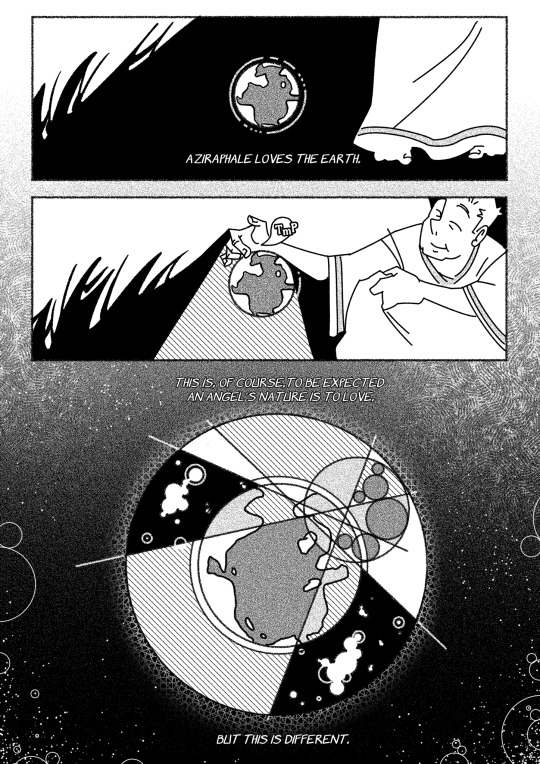
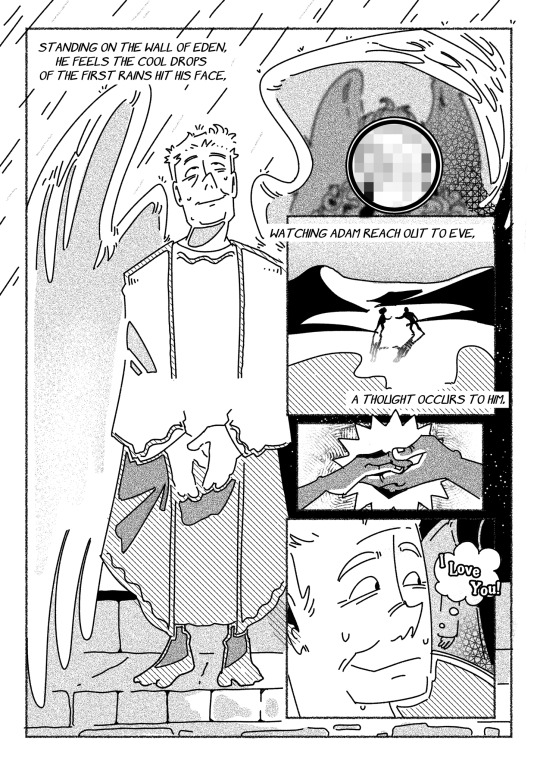
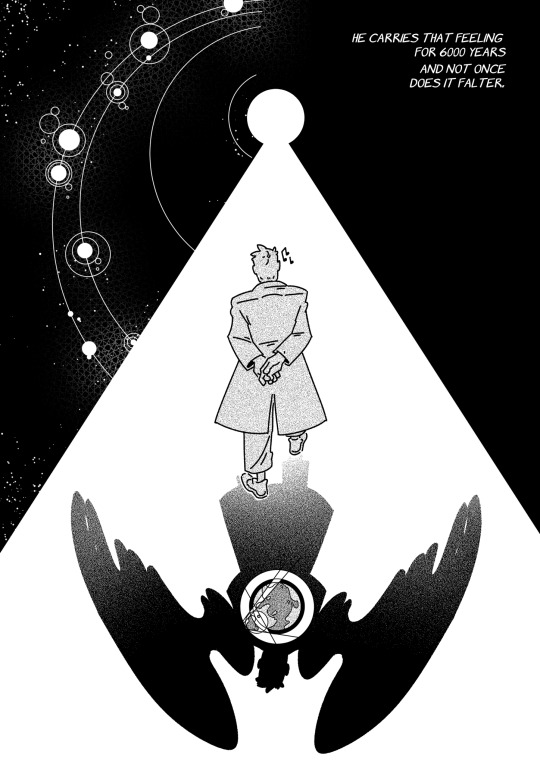
love for humanity from an angelic perspective (unfinished pages under the cut)
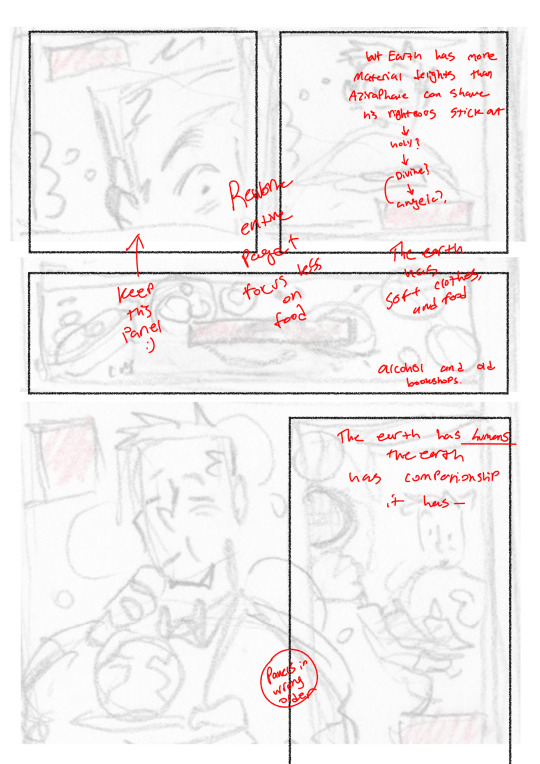
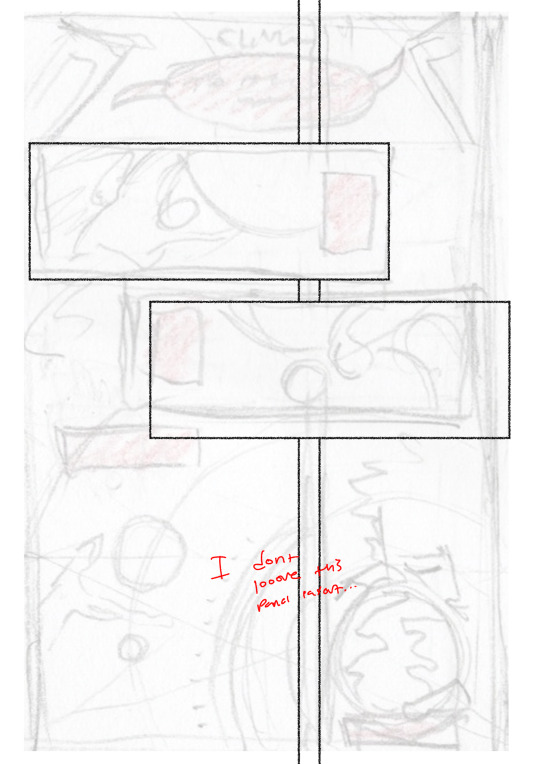
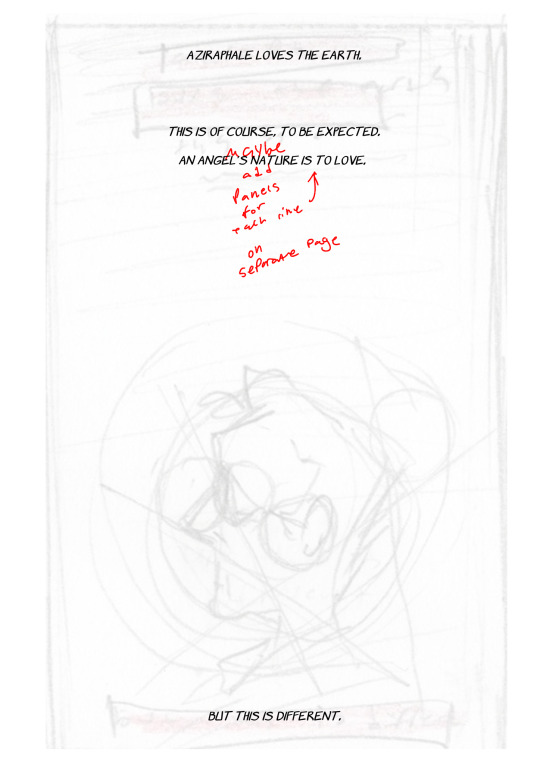
#good omens#gomens#aziraphale#aziracrow#i have a lot of feelings about aziraphale and how he loves#i think his love for earth and humanity tie in closely with his love for crowley#while simultaneously being an entire different thing#he loved crowley because the earth allows him to be free to love. and because that he loves the earth even more in return#his first love was the earth etc etc x#anyways. i crazy#rogart
686 notes
·
View notes
Text
i think a not-insignificant amount of the heartbreak crowley’s feeling in the end is because he’s finally truly understanding that what’s happening with aziraphale (as he perceives it) isn’t something that he can save him from.
#good omens#good omens 2#spoilers#good omens 2 spoilers#like if there's truth in the coffee theory that'll be a whole other thing but if its all straightforward As Perceived#i do think that tracks and i do think that clicked#and there's something very real and painful about that idk#like you can't undo an entire existence of that manipulation and abuse and how much of aziraphale's sense of self is#wrapped up in it all. being an angel being Good serving a Purpose#crowley can give love and support and patience#be a sounding board and ask questions that help aziraphale step back from things and think sometimes#but that greater disconnect and that final realization of what heaven really is. he can't do that FOR aziraphale#aziraphale has to live and experience that on his own and finally actually let himself feel that#bc i think he's very good at not letting himself think about or feel those things even after being so crushed in s1#idk i feel a lot of religious trauma feelings about it i think it parallels that abusive relationship for a reason#like dont get me wrong the BULK of crowleys pain is from that interaction just generally and that rejection#but i think this also plays into it i think that perspective of someone who was thrown out and had the blinders removed#and having this interaction and realizing Oh. Oh there are still hooks deep into aziraphale there's this festering damage#Oh there's no amount of talk or hypotheticals that will sever the tether for him bc even after everything aziraphale BELIEVES. in heaven#as an institution. and idk man im just fascinated with that angle of it for crowley bc its like#SO complex
11 notes
·
View notes
Text
The Good Omens Fandom has had a lot of fun recently with the knowledge of Aziraphale and Crowley holding hands on the bus at the end of season 1.
Soo here's everything that went through my head as I learned of it for the first time.
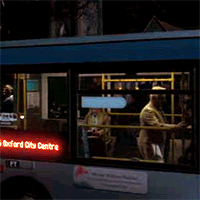
For that entire scene, Aziraphale is really far gone. He's dissociating so hard he can't even realize he's been sitting on a sword. Crowley is probably the only thing keeping him grounded.
They just narrowly stopped Armageddon after a showdown with literally Satan, and still can't let their guard down. For the first time ever, they're completely on their own side. Now they have to orchestrate a body swap to save both of them. They wouldn't just be killed, they'd be completely destroyed. Everything must go exactly according to plan, but how often does that actually happen?
And on top of that, his bookshop, his home, his safe place with the demon he has to pretend not to love is burned and gone.
Crowley is so incredibly gentle and reassuring this entire scene. He's been through so much trauma himself and has spent a lot of his existence shielding the angel from it, hoping to protect some of his innocence and naivete. Crowley is absolutely familiar with every symptom of PTSD and anxiety.
Now he has to see his sweet angel see such a small bit of the horrors of heaven and hell and start to crumble inside. He's going to do his dam best to try and help Aziraphale through it. Speaking softly, ("the bookshop burned down... remember?) slowly and carefully, gradually helping to pull the angel back to reality, reminding him that he's there and will help ground him.
They get on the bus, and sit next to each other. 11 years ago, they sat nearby but separated while Crowley begs Aziraphale to help him prevent the Apocalypse. Now they are sitting together. Both an act of reassurance and unity.
Crowley sits first, Aziraphale could so easily just sit across from him, behind or in front. But he chooses to sit right next to him. And hold his hand. Aziraphale desperately needs to be near to the *former* demon he loves, to hold him, to make sure they won't be separated.
In the book, their famous lines of "none of this would have worked out if you weren't, deep down, just a bit of a good person" and "just enough of a b*stard to be worth liking" came as Satan rose from the earth, as a goodbye in case they were destroyed.
Luckily, that didn't happen and they survived. Armaggedon was stopped. But the angel is still so anxious of losing Crowley. So he chooses to reach out, to anchor himself and reassure himself that Crowley is still there beside him and that they are okay, at least for a few minutes.
And Crowley let him. He knows how badly Aziraphale needs him, he needs the angel just as much. He knows how badly he craved an anchor and support system as he was first abused and traumatized by his Fall, then further by Hell. So he's going to continue being there for Aziraphale, doing everything he can to make his angel feel safe and comfortable.
Over the next few years, Aziraphale would become so much more comfortable reaching out and touching Crowley. Leaning into him, resting a hand on his shoulder or briefly touching his chest. Somehow both reassuring himself that the former demon was still there, and reminding Crowley that he's still there for him at the same time.
Then Crowley becomes more comfortable with the touch, leaning into the angel by himself. No longer flinching at a sudden graze of a hand or reassuring squeeze.
That one moment of the two holding hands on the bus cemented so much of their relationship. "The last few years, not really..." all started on that bus the moment Aziraphale chose to sit down next to Crowley.
edited: at first this said "new knowledge" because I just found out about this all the other day, and wrote this up at 3 AM, and didn't really fact check when this knowledge became well known. I've only really been a GO fan since maybe 2021, and only really started being active in the fandom during the last few months, so a lot of info that is fairly well known is still generally new to me. soo yeah this was edited :)
source for anyone asking for it!
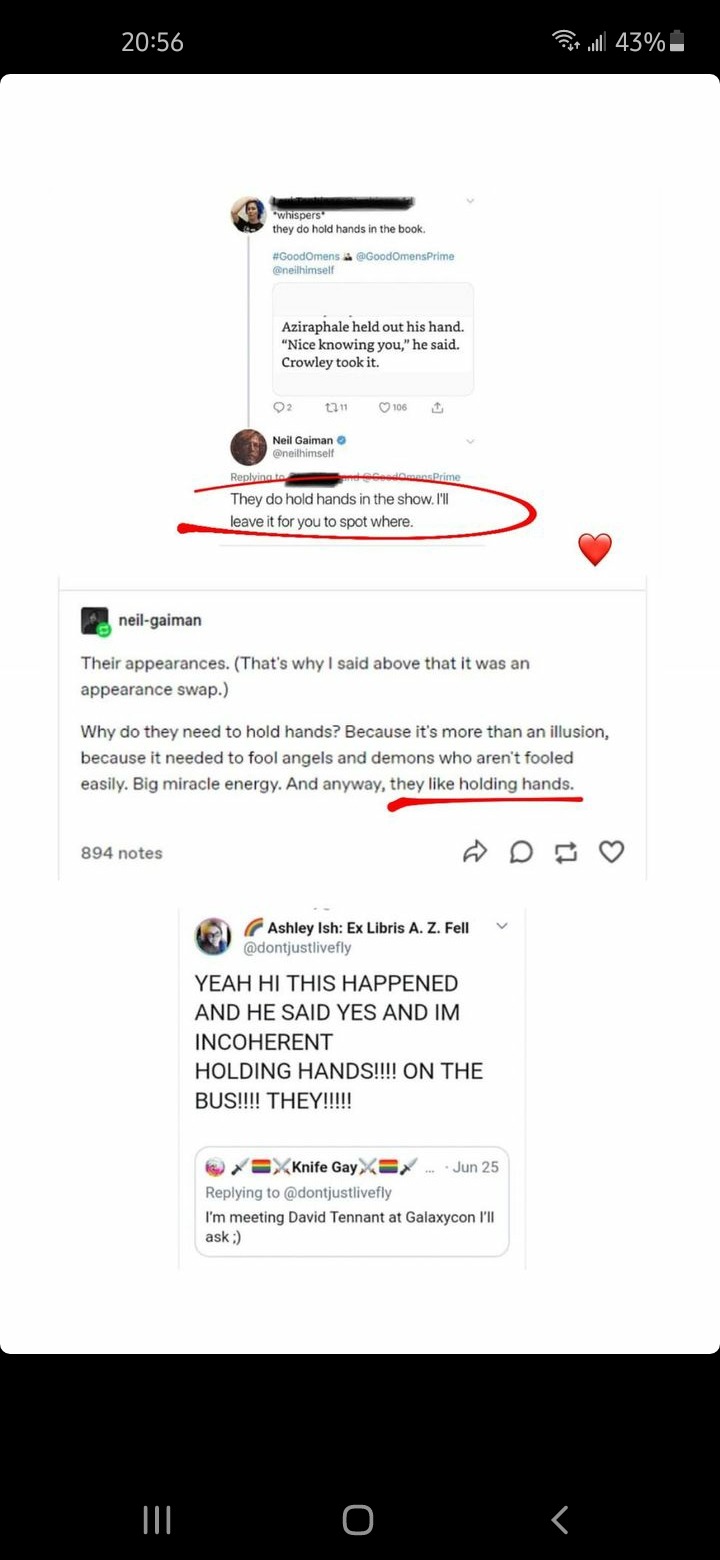
#good omens spoilers#crowley#aziracrow#ineffable husbands#aziraphale#good omens#go2#bus scene#they like holding hands#neil gaiman#david tennant#michael sheen
5K notes
·
View notes
Text
'...“It’s fun playing bad, but actually he’s not,” the actor says, smiling as he reflects on his character, Crowley. “He’s a villain with a heart. The amount of really evil things he does are vanishingly small.”
...As it always has, “Good Omens” dissects the view of good and evil as absolutes, showing viewers that they are not as separate as we were led to believe growing up. Aziraphale and Crowley’s long-standing union is proof of this. The show also urges people to look at what defines our own humanity. For Tennant — who opted to wear a T-shirt emblazoned with the words “Leave trans kids alone you absolute freaks” during a photocall for Season 2 — these themes are more important now than ever before.
“In this society that we’re currently living in, where polarization seems ever more present, fierce and difficult to navigate. Negotiation feels like a dirty word at times,” he says, earnestly. “This is a show about negotiation. Two extremes finding common ground and making their world a better place through it. Making life easier, kinder and better. If that’s the sort of super objective of the show, then I can’t think of anything more timely, relevant or apt for the rather fractious times we’re living in.”
“Good Omens” is back by popular demand for another season. How does it feel?
It’s lovely. Whenever you send something out into the world, you never quite know how it will land. Especially with this, because it was this beloved book that existed, and that creates an extra tension that you might break some dreams. But it really exploded. I guess we were helped by the fact that we had Neil Gaiman with us, so you couldn’t really quibble too much with the decisions that were being made. The reception was, and continues to be, overwhelming.
Now that you’re no longer bound by the original material that people did, perhaps, feel a sense of ownership over, does the new content for Season 2 come with a sense of freedom for you? This is uncharted territory, of sorts.
That’s an interesting point. I didn’t know the book when I got the script. It was only after that I discovered the worlds of passion that this book had incited. Because I came to it that way, perhaps it was easier. I found liberation from that, to an extent. For me, it was always a character that existed in a script. At first, I didn’t have that extra baggage of expectation, but I acquired it in the run-up to Season 1 being released… the sense that suddenly we were carrying a ming vase across a minefield.
In Season 2, we still have Neil and we also have some of the ideas that he and Terry had discussed. During the filming of the first one, Neil would drop little hints about the notions they had for a prospective sequel, the title of which would have been “668: The Neighbour of the Beast,” which is a pretty solid gag to base a book around. Indeed there were elements like Gabriel and the Angels, who don’t feature in the book, that were going to feature in a sequel. They were brought forward into Season 1. So, even in the new episodes, we’re not entirely leaving behind the Terry Pratchett-ness of it all.
It’s great to see yourself and Michael Sheen reunited on screen as these characters. Fans will have also watched you pair up for Season 3 of “Staged.” You’re quite the dynamic duo. What do you think is the magic ingredient that makes the two of you such a good match?
It’s a slightly alchemical thing. We knew each other in passing before, but not well. We were in a film together [“Bright Young Things,” 1993] but we’d never shared a scene. It was a bit of a roll of the dice when we turned up at the read-through for “Good Omens.” I think a lot comes from the writing, as we were both given some pretty juicy material to work with. Those characters are beloved for a reason because there’s something magical about them and the way they complete each other. Also, I think we’re quite similar actors in the way we like to work and how we bounce off each other.
Does the shorthand and trust the two of you have built up now enable you to take more risks on-screen?
Yes, probably. I suppose the more you know someone, the more you trust someone. You don’t have to worry about how an idea might be received and you can help each other out with a more honest opinion than might be the case if you were, you know, dancing around each other’s nervous egos. Enjoying being in someone’s orbit and company is a positive experience. It makes going to work feel pleasant, productive, and creative. The more creative you can be, the better the work is. I don’t think it’s necessarily a given that an off-screen relationship will feed into an on-screen one in a positive or negative way. You can play some very intimate moments with someone you barely know. Acting is a peculiar little contract, in that respect. But it’s disproportionately pleasurable going to work when it’s with a mate.
Fans have long discussed the nature of Crowley and Aziraphale’s relationship. In Season 2, we see several of the characters debate whether the two are an item, prompting them to look at their union and decipher what it is. How would you describe their relationship?
They are utterly co-dependent. There’s no one else having the experience that they are having and they’ve only got each other to empathize with. It’s a very specific set of circumstances they’ve been dealt. In this season, we see them way back at the creation of everything. They’ve known each other a long time and they’ve had to rely on each other more and more. They can’t really exist one without the other and are bound together through eternity. Crowley and Aziraphale definitely come at the relationship with different perspectives, in terms of what they’re willing to admit to the relationship being. I don’t think we can entirely interpret it in human terms, I think that’s fair to say.
Yet fans are trying to do just that. Do you view it as beyond romantic or any other labels, in the sense that it’s an eternal force?
It’s lovely [that fans discuss it] but you think, be careful what you wish for. If you’re willing for a relationship to go in a certain way or for characters to end up in some sort of utopian future, then the story is over. Remember what happened to “Moonlighting,” that’s all I’m saying! [Laughs]
Your father-in-law, Peter Davison, and your son, Ty Tennant, play biblical father-and-son duo Job and Ennon in Episode 2. In a Tumblr Q&A, Neil Gaiman said that he didn’t know who Ty’s family was when he cast him. When did you become aware that Ty had auditioned?
I don’t know how that happened. I do a bunch of self-tapes with Ty, but I don’t think I did this one with him because I was out of town filming “Good Omens.” He certainly wasn’t cast before we started shooting. There were two moments during filming where Neil bowled up to me and said, “Guess, who we’ve cast?” Ty definitely auditioned and, as I understand it, they would tell me, he was the best. I certainly imagine he could only possibly have been the best person for the job. He is really good in it, so I don’t doubt that’s true. And then my father-in-law showed up, as well, which was another delicious treat. In the same episode and the same family! It was pretty weird. I have worked with both of them on other projects, but never altogether.
There’s a “Doctor Who” cameo, of sorts, in Episode 5, when Aziraphale uses a rare annual about the series as a bartering tool. In reality, you’ll be reprising your Time Lord role on screen later this year in three special episodes to mark the 60th anniversary. Did you always feel you’d return to “Doctor Who” at some point?
There’s a precedent for people who have been in the series to return for a multi-doctor show, which is lovely. I did it myself for the 50th anniversary in 2013, and I had a wonderful time with Matt [Smith]. Then, to have John Hurt with us, as well, was a little treat. But I certainly would never have imagined that I’d be back in “Doctor Who” full-time, as it were, and sort of back doing the same job I did all those years ago. It was like being given this delightful, surprise present. Russell T Davies was back as showrunner, Catherine Tate [former on-screen companion] was back, and it was sort of like the last decade and a half hadn’t happened.
Going forward, Ncuti Gatwa will be taking over as the new Doctor. Have you given him any advice while passing the baton?
Oh God, what a force of nature. I’ve caught a little bit of him at work and it’s pretty exciting. I mean, what advice would you give someone? You can see Ncuti has so much talent and energy. He’s so inspired and charismatic. The thing about something like this is: it’s the peripherals, it’s not the job. It’s the other stuff that comes with it, that I didn’t see coming. It’s a show that has so much focus and enthusiasm on it. It’s not like Ncuti hasn’t been in a massive Netflix series [“Sex Education,”] but “Doctor Who” is on a slightly different level. It’s cross-generational, international, and has so much history, that it feels like it belongs to everyone.
To be at the center of the show is wonderful and humbling, but also a bit overwhelming and terrifying. It doesn’t come without some difficulties, such as the immediate loss of anonymity. It takes a bit of getting used to if that’s not been your life up to that point. I was very lucky that when I joined, Billie Piper [who portrayed on-screen companion, Rose] was still there. She’d lived in a glare of publicity since she was 14, so she was a great guide for how to live life under that kind of scrutiny. I owe a degree of sanity to Billie.
Your characters are revered by a few different fandoms. Sci-fi fandoms are especially passionate and loyal. What is it like being on the end of that? I imagine it’s a lot to hold.
Yes, certainly. Having been a fan of “Doctor Who” since I was a tiny kid, you’re aware of how much it means because you’re aware of how much it meant to you. My now father-in-law [who portrayed Doctor Who in the 80s] is someone I used to draw in comic strips when I was a kid. That’s quite peculiar! It’s a difficult balance because on one end, you have to protect your own space, and there aren’t really any lessons in that. That does take a bit of trial and error, to an extent, and it’s something that you’re sometimes having to do quite publicly. But, it is an honor and a privilege, without a doubt. As you’ve said, it means so much to people and you want to be worthy of that. You have to acknowledge that and be careful with it. Some days that’s tough, if you’re not in the mood.
I know you’re returning to the stage later this year to portray Macbeth. You’ve previously voiced the role for BBC Sounds, but how are you feeling about taking on the character in the theater?
I’m really excited about it. It’s been a while since I’ve done Shakespeare. It’s very thrilling but equally — and this analogy probably doesn’t stretch — it’s like when someone prepares for an Olympic event. It does feel like a bit of a mountain and, yeah, you’re daring to set yourself up against some fairly worthy competition from down the years. That’s both the challenge and the horror of doing these types of things. We’ve got a great director, Max Webster, who recently did “Life of Pi.” He’s full of big ideas. It’s going to be exciting, thrilling, and a little bit scary. I’m just going to take a deep breath.
Before we part ways, let’s discuss the future of “Good Omens.” Gaiman has said that he already has ideas for Season 3, should it happen. If you were to do another season, is there anyone in particular you’d love to work with next time around or anything specific you’d like to see happen for Crowley?
Oh, Neil Gaiman knows exactly where he wants to take it. If you’re working with people like Gaiman, I wouldn’t try to tamper with that creative void. Were he to ask my opinion, that would be a different thing, but I can’t imagine he would. He’s known these characters longer than me and what’s interesting is what he does with them. That’s the bit that I’m desperate to know. I do know where Crowley might end up next, but it would be very wrong if I told you.
[At this point, Tennant picks up a pencil and starts writing on a hotel pad of paper.]
I thought you were going to write it down for me then. Perhaps like a clandestine meeting on a bench in St James’ Park, but instead you’d write the information down and slide it across the table…
I should have done! I was drawing a line, which obviously, psychologically, I was thinking, “Say no more. You’re too tempted to reveal a secret!” It was my subconscious going “Shut the fuck up!”
#David Tennant#Michael Sheen#Good Omens#Neil Gaiman#Terry Pratchett#Ty Tennant#Peter Davison#Aziraphale#Crowley#Doctor Who#Macbeth#Ncuti Gatwa#Job#Ennon#Bright Young Things#Series 2#Matt Smith#John Hurt#Russell T. Davies#Catherine Tate#Max Webster#Life of Pi#Sex Education#Billie Piper#Rose Tyler#BBC Sounds
3K notes
·
View notes
Text
analyzing some images (for fun)
so i found this pair of promotion images for good omens season 1 on the good omens reference library server and it’s hooked me so so bad im having feelings about it. we’re analyzing them now. not really for meta purposes just fun to see the parallels and differences :)

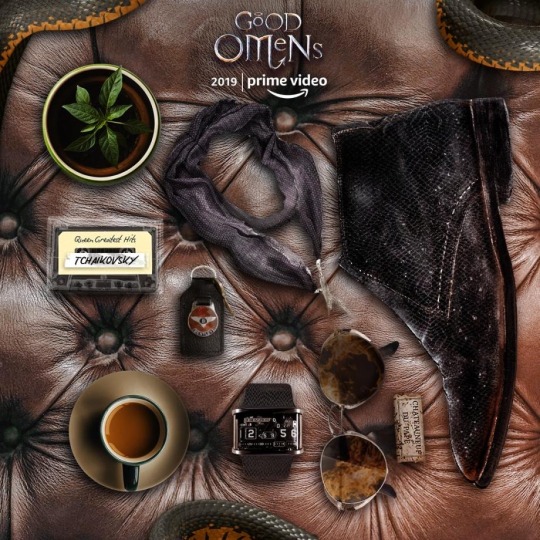
everything under the cut !
unique traits
aziraphale:
1) his plank background. its older, its crisp, it smells like wood from the screen. mmmm
2) the pencil shavings at the bottom. he does a lot of writing honestly, so i like this. also adds a messy and cozy vibe he always seems to have in that shop…. i like that blessed shop fr
3) his SUSHI. little soy sauce drops near it too—just the right amount of deliberate mess. our first formal introduction to aziraphale in the present day and beginning the Tomfoolery just happens to have sushi... i watch that scene and i go “yeah, that sums up aziraphale i suppose” very nicely. (they dont have sushi Up There) (im literally never gonna forget that)
4) the ray of light shining on the scene. tiny thing, but a bit of the heaven is peeking through..it also sort of blurs the whole image but i think thats just me.
5) and we’ve saved the best for last: the big whopper. the nice and accurate prophecies of agnes nutter, witch. I LOVE THAT BOOK!!!!!!! i cant remember if that ring stain was there but if it isnt in the show on the actual book i’d assume thats to add that ‘thy cocoa doth grow cold’ thing. ALSO. you know what’s being used as a bookmark in the pages?? a check for the ritz. he bookmarked their one chance for living . with a ritz check . MMMMMM. my GOD. that means so much to me even if i cant convey it in words. he KEEPS THE CHECKS 😭😭😭😭😭😭
crowley:
1) let me get my favorite out of the way. crowley’s glasses have fire in their reflection. we’ll talk about the glasses themselves later but the REFLECTION IN THEM. fucking FIRE, BOOKSHOP fire, PAIN, SRIVING THROUGH THE M-25, HELL, I DONT KNOWIM HAVING FEELINGS!!! i do believe this is a bookshop fire reference though, the flames feel too Familiar. the lengths people will go to to attack others 🤧
2) the leather seat background!!!!!!! probably meant to look similar to the bentley’s seats but i cant recall their texture, exactly. maybe just meant to convey modernness—unsure. still, its there <3
3) the tiny little crisp plant </3 its trying his damned best to stay perfect. it might a specific plant that means something, but i cant tell at thsi angle, so i’ll assume its a mini version of the ficus he keeps in the flat. its so SMALL and sitting in ANOTHER POT i CANT
4) the snake slithering!! black and red (in this image it looks orange lol) bellied scales!!!! slithering there, chilling, being crowley, showing hints. love it
5) QUEEN RECORD!!!!! TRYING TO OVERRIDE IT WITH TCHAIKOVSKY!!!!!! the tape over it does a reminisence to crowley’s handwriting, but in a clean ‘this made made to be a font’ way. not exactly just yet. ive become a fan of tchaikovsky recently. amazing darling wonderful crowley, trying to push the rock up the hill for eternity 😞
6) HIS LITTLE DEMON KEY THING. HOLDING A TINY LITTLE BENTLEY CAR KEY OHHH. thats how he doesnt lose the tiny key despite probably not needing one of those. and he CHOSE that intentionally probably. little wings and red circle….URGHHHHHHH
similarities
mmmmm now here’s the good shit. similarities! i’ll bullet point most of them but ohhhhh. ohhhh these. i’ll go from top to bottom as best i can….
1) one of their shoes, obviously. crowley has them iconic snakeskin shoes while aziraphale has his old loafers like the old loafer he is /pos
2) chateauneuf de pape wine bottle labels! (crowley’s is under his glasses, aziraphale’s is next to his shoe). oh my fucking god theyre MATCHING. the labels are old, battered, of course labeling the drink’s age, but mmmmm its these tiny details that get me going….
3) their respective drinks in their mugs—crowley’s a black mug coffee (or what looks to be coffee) and aziraphale’s angel mug tea (or what looks to be tea). i think about that mug sometimes. where did he get that from?? mystery for the ages….
4) their glasses, of course. crowley’s iconic sunglasses and aziraphale’s reading spectacles. i cant really tell the reflections in this pair, but if its supposed to be fucking fire, im done with this. im giving up forever
5) their own watches! aziraphale’s is visibily older while crowley’s is visibly modern, but they function just the same. also, crowley’s is set to 2:56:59 (presumably PM), which is around the time we see when crowley starts checking his watch at warlock’s birthday party. its almost time for disaster to strike!! 😃
6) and finally….their ties!! they have their own ties!!! or more accurately, neck accessories, but i digress. i mesn i assume its crowley’s neck tie, because the fabric looks… different. either way, crowley’s neck thingie is very whispy and aziraphale has his funky little bowtie i love so much,,,
okay thats it. there’s no canonical implications, any fantheories, none of the sort. just saw a pair of images and my mind went GOD DAMN!!!!!! theyre very important to me. i need to look at more promo material 😔
930 notes
·
View notes
Text
Lovely new article about Michael in Paste magazine. Article is behind a paywall, so here is a transcription (with thanks to the person on FB who transcribed it, and the parts in bold are my own emphasis).
There’s so much to love about Prime Video’s Good Omens. A delightful adaptation of the popular Neil Gaiman and Terry Pratchett novel of the same name, the series is romantic, thoughtful, hilarious, and heartfelt by turns. The story of the almost-apocalypse and what comes afterward, it wrestles with big concepts like destiny, free will, and forgiveness, all framed through the lens of an unorthodox relationship between an angel and a demon whose love for one another is a key to saving the world.
As anyone who has watched Good Omens already knows, nothing about this series works without the pair of lead performances at its center. Stars David Tennant and Michael Sheen—who play the demon Crowley and the angel Aziraphale, respectively—have the kind of lighting-in-a-bottle chemistry that’s the stuff of legend, and their characters’ every interaction conveys both their deep affection for one another and the Earth they’ve made their home. Their romance is the emotional linchpin around which most of the series turns, and their heartbreaking separation in the Season 2 finale is so devastating precisely because we’ve seen how necessary the two are to each other’s lives.
But it’s Sheen’s performance in that final scene that really twists the knife. As Aziraphale’s face crumples following his and Crowley’s long-awaited kiss, the actor manages to convey what feels like every possible human emotion in the span of less than thirty seconds as the angel realizes what he has both had and just lost. The moment is emotionally brutal to watch, particularly after sitting through five and a half episodes of Aziraphale looking as lovestruck as the lead in any rom-com. Sheen makes it all look effortless, shifting from giddy joy to devastated longing and everything in between, and we really don’t talk enough about how powerful and underrated his work in this series truly is.
Though he’s half of the central duo that makes Good Omens tick, Sheen’s role often tends to get overshadowed by his co-star’s. It’s not difficult to see why, given that Tennant gets to spend most of the show swanning around in tight trousers looking like the Platonic ideal of the charming bad boy, complete with flaming red hair and dramatic eyewear. Tennant also benefits from Crowley’s much more sympathetic emotional arc. I mean, it’s hard not to love a cynical demon with a heart of gold who’s been pining after his angelic best friend for literal millennia even after being cast out from Heaven. Of course, viewers are drawn to that—likely a lot more easily than the story of an angel who’s simply trying the best he can to do the right thing as he wrestles with his role in God’s Ineffable Plan. Plus, let’s be real, Tennant’s sizeable Doctor Who fanbase certainly doesn’t hurt his character’s popularity.
As a performer, Sheen has a long history of playing both real people (Tony Blair, David Frost, Brian Clough) and offbeat villains (Prodigal Son’s Martin Whitly, Underworld’s Lucian, the Twilight Saga’s Aro). In some ways, the role of a fussy, bookish angel is playing more than a bit against type for him—Gaiman himself has said he originally intended for Sheen to be Crowley—but in his capable hands, Aziraphale becomes something much more than a simple avatar for the forces of Good (or even of God, for that matter). With a soft demeanor and a positively blinding smile, Sheen’s take on the character consistently radiates warmth and goodness, even as it contains surprisingly hidden depths. The former guardian of the Eastern Gate of Eden who gifted a fleeing Adam and Eve his flaming sword and befriended the Serpent who caused their Fall, Azirphale isn’t a particularly conventional angel. He enjoys all-too-human indulgences like food and wine, runs a Hoarders-esque bookshop that never seems to sell anything, and spends most of his time making heart eyes at the being that’s meant to be his hereditary adversary.
Given the much more difficult task of playing the literal angel to Tennant’s charming devil, Sheen must find a way to make ideas like goodness and forgiveness as interesting and fun to watch as their darker counterparts. It’s a generally thankless task, but one that Sheen tackles with gusto, particularly in the series’ second season, as Good Omens explores Aziraphale’s slowly evolving idea of what he can and cannot accept in terms of being a soldier of Heaven. His growing understanding that the truth of creation is colored in shades of grey and compromise is often conveyed through little more than Sheen’s deftly shifting expressions and body language.
Our pop culture consistently struggles to portray the idea of goodness as something compelling or worth watching. Explicitly “good” characters, particularly those who are religiously coded, are frequently treated as the butt of some sort of unspoken joke they aren’t in on, used to underline the idea that faith is a form of naivety or that kindness is somehow a weakness. For a lot of people, the entire concept of turning the other cheek is a sucker’s bet, and believing in something greater than oneself, be it a higher power or a sense of purpose, is a waste of time. But Good Omens is a story grounded in the idea that faith, hope, and love—for one another, God, and the entire world—are active verbs. And nowhere is that more apparent than in Sheen’s characterization of the soft angel whose old-fashioned waistcoats mask a spine of steel and who refuses to give up—on Crowley, on humanity, or on the idea that Heaven is still something that can be saved.
Though he and Tennant have pretty much become a matched set at this point (both on and off-screen), Sheen’s performance has rarely gotten the critical accolades it deserves. (Tennant alone was nominated for a BAFTA for Season 2, and Sheen was categorized as a supporting actor when the series’ competed in the 2019 Saturn Awards.) But it is his quiet strength that holds up so much of the rest of the show around him, and Sheen deserves to be more frequently recognized for it. That he makes it look so easy is just another sign of how good his performance really is.
I love this so much. The thoroughly well-deserved praise for Michael's incredible performance as Aziraphale, but also that Aziraphale and Crowley's relationship is specifically described as a "romance." And of course, the first sentence of the last paragraph that acknowledges how much Michael and David are indeed a "matched set" that cannot (and should not) be separated...
#michael sheen#welsh seduction machine#good omens 2#aziraphale#david tennant#soft scottish hipster gigolo#crowley#ineffable husbands#their chemistry is and always will be amazing#i truly do not think we would have had a season 2 without Michael and David#but we can now see how their connection informed the relationship between aziraphale and crowley#they are perfect together your honor#mutual wanting#in and out of character#a friendship that's become something more#ineffable lovers#<3
488 notes
·
View notes
Text
we need to talk about how close aziraphale actually was to saying no to the metatron after the kiss and why:
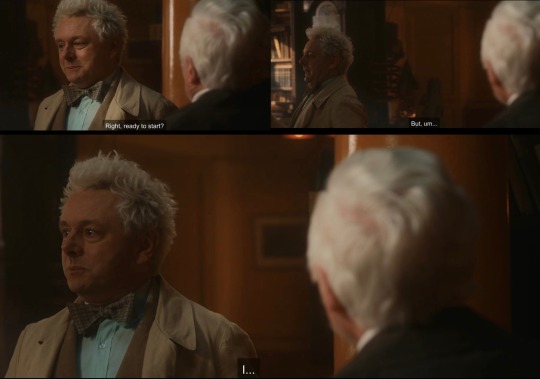
he's extremely conflicted and keeps looking out of the window to crowley in the car.
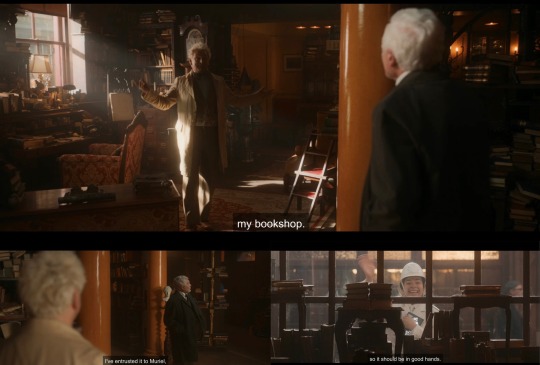
he previously said "nothing last forever" when crowley told him that he cant leave the bookshop (crowley also meant "you cant leave me"; the bookshop is a metaphor for their lives on earth for him) and he states exactly this as the first objection here. obviously the metatron shuts it down by appointing muriel as the next owner of the shop.
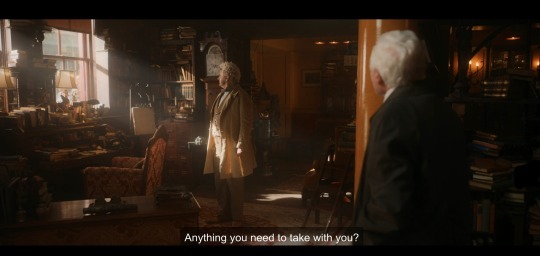
now he's stuck between wanting to be with the being he loves & who he now knows loves him back and his deep inner need/duty to do good. crowley's confession and kiss clearly made him question his decision and change his mind because here is when he actually decides for both.
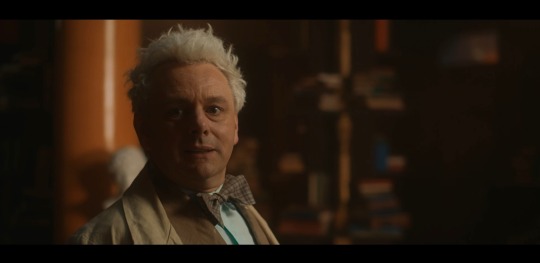
you can see how he does not want to join heaven alone. he keeps looking out the window when asked if he needs anything to take with him.
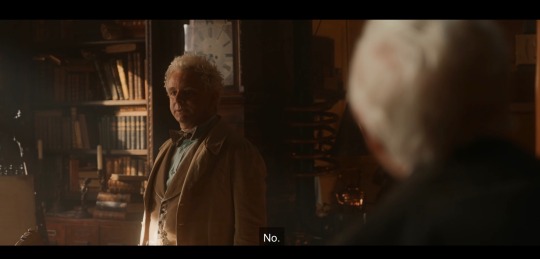
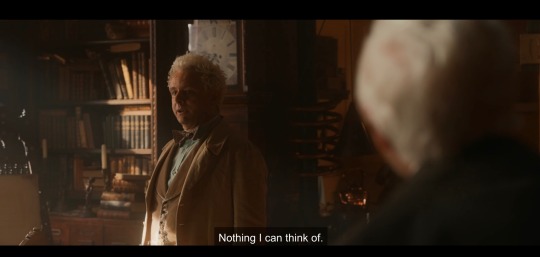
he desperately needs crowley there but he can not have him so he lies and says no.
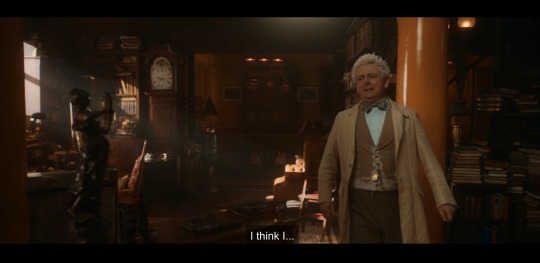
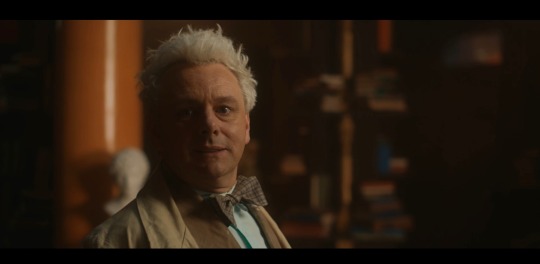
i this moment he tries to say no to heaven one last time. he starts saying "i think i-" and then looks out to crowley one last time. he's really considering crowleys offer here. i think the decision that he makes instead is actually FOR crowley as well.
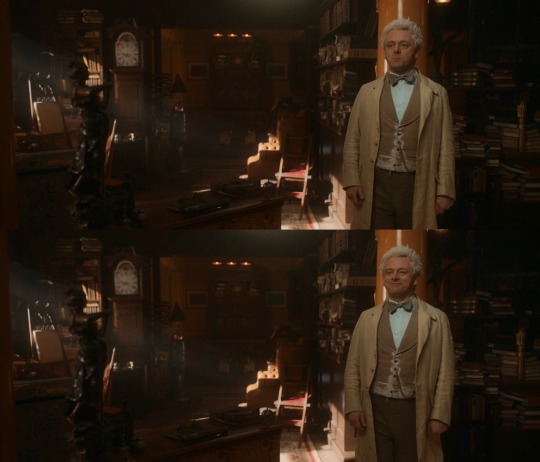
he decides to join heaven not as he was previously convinced by the metatron to do good and rule together with crowley (which he did not want to do) but instead to go and keep a close eye on heaven FOR crowley.
aziraphale isnt stupid, he remembers what crowley said about heaven being toxic.
i think the confession and kiss makes him question heaven. crowley, who fell for asking questions made aziraphale question heaven too. something that he was always too scared to do. he has started to rebel in his head. he realised that something has to be up with heaven/the metatron bc they offered him the position. he decided to go but with a completely different purpose than before.
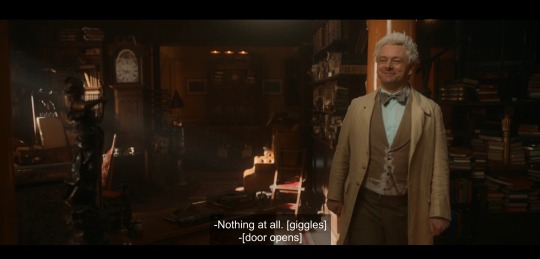
he puts on a smile and it seems fake because it is. he wants to appear like he hasn't just fundamentally changed his position and decided to go against the one force who he was always afraid of yet dependent on.
this is sth extremely relatable to someone who is queer and autistic and was raised by very conservative family members. even the thought of supporting queer people felt rebellious, terrifying but also extremely exiting and powerful because i knew it was the right thing to believe.
aziraphale was being so brave here. he saw a glimpse of the life he wants and can have and choose to join heaven anyway to fight for this life. he is convinced it will not be possible for them to be together if heaven is still kicking about and making him feel powerless and scared. he wants to secure their future by changing or possibly even destroying the system from the inside out.
unfortunately he didn't have time to tell crowley about his change of intention and i think it really breaks his heart. crowley would probably not understand it anyway. they still have a lot to work through and learn but ultimately they will find each other again. they always do.
i am so so interested to see where and how they meet again in s3, if we get it. after everything i just really want them to be happy and to spend their eternity together. they deserve it after all they went through.
#good omens#gos2 spoilers#good omens s2 theories#good omens s2#good omens 2#gos2#go2#aziracrow#good omens spoilers#ineffable husbands#good omens theory#1k#2k#sage posting
3K notes
·
View notes
Text
The Final 15 - Aziraphale’s Perspective
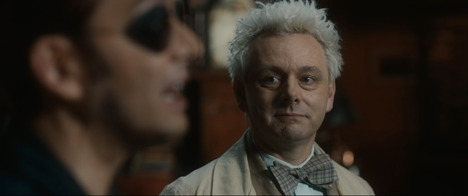
I see a lot of empathy for Crowley’s experience during the final 15 minutes of season 2 and it makes sense that we feel deeply for him. What he is experiencing is very human - acknowledging the depth of his own feelings, plucking up the courage to say something, having it come out all wrong, feeling utterly rejected, and then walking away in a mix of pain and anger. Who among us hasn’t been there?
But Aziraphale is experiencing something more complicated, something fewer of us have analogs for. Aziraphale has internally acknowledged his feelings for Crowley for some period of time, probably at least since 1941. Michael Sheen confirms this mental state in a NYCC 2018 interview:
“I decided early on that Aziraphale just loves Crowley. And that’s difficult for him because they are on opposite sides and he doesn’t agree with him on stuff. But it does really help as an actor to go, ‘My objective in this scene is to not show you how much I love you and just gaze longingly at you.’”
Unlike Crowley, Aziraphale’s struggle isn’t acknowledging his feelings. His struggle appears to be two-fold: 1) believing that Crowley could ever love him back and 2) even if Crowley did love him, believing a future for the two of them together could exist within the restrictions of his larger world view.
Can Crowley love?
Angels are, traditionally, beings of love. We see Aziraphale embody this time and again, showing kindness and support to almost everyone he meets, including the amnesiac Gabriel who has treated him abominably in the past. He is attuned to love, remarking on how the area around Tadfield “feels loved” twice in Season 1. As for how Aziraphale personally understands and expresses love, he shows his love to others through verbal affirmation and, to a lesser extent, physical touch. There are many examples of Aziraphale expressing his love for Crowley through positive verbal affirmation, typically by praising him for instances where he has been kind, nice, or good. And on the rare occasions when Aziraphale receives verbal praise, he absolutely interprets it as an expression of love, blossoming with happiness.
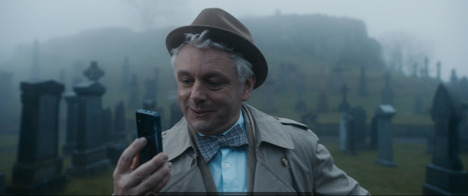
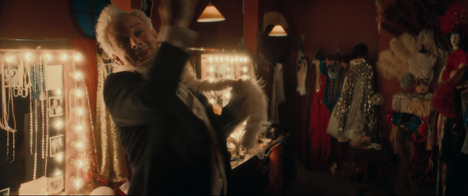
But from Aziraphale’s perspective, it may be unclear if Crowley can feel love in the same way. Can demons love? Did he lose that capability when he fell? Crowley can’t feel the aura of love in Tadfield that Aziraphale remarks on, and his reactions to Aziraphale’s praise are always to shrug it off, tell Aziraphale to “shut up,” or in the most extreme case to physically slam him against a wall and get in his face about it. In this last instance he tells Aziraphale, “I’m a demon, I’m not nice. I'm never nice. Nice is a four-letter word.” A four-letter word, like love, that is not in Crowley’s self-defined vocabulary.
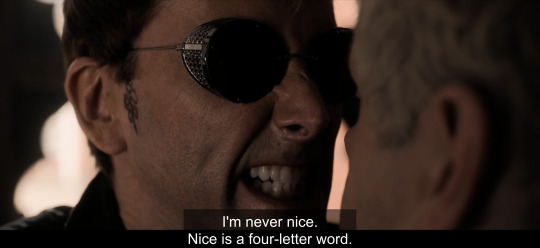
If Crowley can feel love, does he love Aziraphale?
Even if Aziraphale believes Crowley is capable of feeling love, he does not always recognize how Crowley expresses it in the moment. Crowley shows his love for Aziraphale through actions, but Aziraphale often misconstrues Crowley’s motivations. In 1793 when Crowley rescues him from the Bastille, Aziraphale initially assumes Crowley is only there because he is responsible for the Reign of Terror. Similarly, in 1941, Aziraphale’s reaction to Crowley’s appearance is to assume he’s just part of the Nazi gang, saying,“I should have known. Of course. These people are working for you!”
Crowley doesn’t help matters in this regard because he is constantly muting and undercutting his signals to Aziraphale. Every time Crowley expresses his love for Aziraphale through actions - rescuing him, saving his books, even taking him to lunch - he does so in a nonchalant, dismissive manner, indicating he ascribes little value or importance to the actions he has performed. “I just didn’t want to see you embarrassed,” he says when he appears in 1941. And when Aziraphale positively glows with happiness about his books being saved, Crowley tells him to “shut up."On top of these confusing signals, Crowley is almost pathologically incapable of expressing his feelings in the verbal love language that Aziraphale can understand. This is heartbreakingly demonstrated in this scene after the bookshop fire:
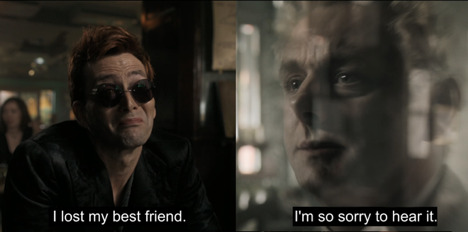
Crowley can’t even say “I lost you.” Instead he speaks of Aziraphale in the third person while sitting in front of him, saying, “I lost my best friend.” The little hitch on Aziraphale’s face when he hears this is just devastating. Who is Crowley talking about? The last conversation they had before this scene was when Aziraphale called while Hastur was in Crowley’s apartment and Crowley said, “Not a good time - got an old friend here.” Aziraphale is left to wonder - is that who Crowley means when he says "best friend?" Crowley is everything to Aziraphale, but what is he to Crowley?
How Would It Even Work?
Even when Aziraphale does get flashes of the possibility that Crowley may care for him he immediately runs up against his second mental block - there is no world he can imagine where they could be together. When Crowley first suggests running off together in the bandstand scene in S1E3, Aziraphale collapses under the thought: “Friends? We aren’t friends. We are an angel and a demon. We have nothing whatsoever in common. I don’t even like you.”
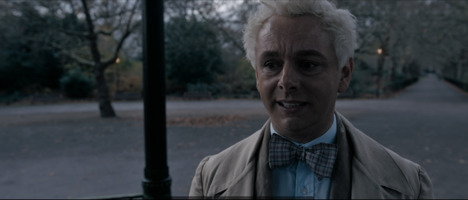
While he is obviously in denial, Aziraphale is also under tremendous stress in this moment and is desperately trying to hold onto some stability by falling back onto his world view and ideology. In this state he backpedals all the way to “I don’t even like you.” In his understanding of the way the universe is supposed to work, he and Crowley are hereditary enemies and should not even be friends, much less in love. Aziraphale expresses this core belief throughout the series. What kind of existence could they ever have together in reality?
The Final 15
With this as a background, we can better understand what Aziraphale experiences in the final 15 minutes. Even before the Metatron enters the scene, Aziraphale begins to have his fundamental beliefs challenged which puts him off his footing. The revelation that Gabriel and Beelzebub are in love is deeply impactful. When Beelzebub says “I just found something that mattered more to me than choosing sides” and takes Gabriel’s hand, Aziraphale immediately reaches out to make contact with Crowley, a look of incredulity on his face. Here is proof that demons can feel love and that an angel and a demon can carve out a space together. The road may be difficult, but it is not impossible.
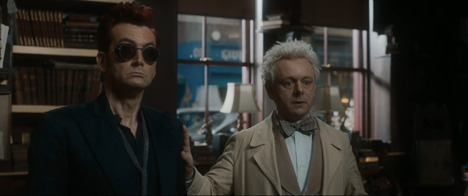
Before Aziraphale can digest this revelation the stakes are ratcheted up: Michael threatens to erase Aziraphale from the Book of Life due to his part in hiding Gabriel. The future that Aziraphale has just barely glimpsed is already under siege. It is at this point that The Metatron enters, offering Aziraphale not just survival and protection, but a version of everything he has ever wanted.
If Crowley is reinstated as an angel, Aziraphale will no longer have to wonder whether Crowley is capable of feeling love. And if they are both angels, there will be no conflict inherent in having a life together. In one fell swoop, the Metatron entices Aziraphale with a future where there are no remaining blockers to an eternal, loving existence with Crowley. It will be “like the old times, only even nicer” because they now have millennia of their shared history to build on together. Of course this logic is horribly flawed and does not take into account at all what Crowley wants, but in the moment it must feel like an enormous gift to Aziraphale.
Unfortunately, not only is Crowley’s reaction to this “incredibly good news” not what Aziraphale expects, the conversation quickly takes a baffling turn for him. Crowley shuts down the talk about returning to heaven and attempts to say what he wants to say. Sadly he once again utterly fails to speak in a way that Aziraphale can understand.
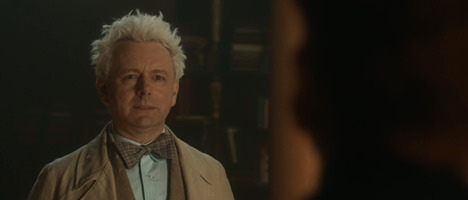
The audience knows what Crowley is trying to say because we have the context of his earlier conversation with Maggie and Nina. But Aziraphale lacks that and thus can’t understand where this is coming from or what it means. Rather than expressing his feelings as Beelzebub and Gabriel did, Crowley recites facts: we’ve known each other a long time, we’ve been on this planet a long time, I could always rely on you, you could always rely on me. He can’t even say the word “couple” when he describes them, referring to them more as colleagues with words like “team” and “group.” And the one time he does try to express his feelings and desires he is physically unable to get out the words: “And I would like to spend—.” He then retreats into his old plea to turn away from heaven and hell and run off together. Nowhere in Crowley’s confession does Aziraphale hear “I love you” or even “I want to be with you.” What he hears instead is what he’s heard multiple times before - Crowley wants to abandon both heaven and hell and default to just the two of them. From Aziraphale’s perspective this will not solve anything for them. They will still be an angel and a demon, at some level fundamentally separated by their very natures.
Having failed in his speech, Crowley then does two things in rapid succession that must be excruciatingly painful for Aziraphale. First, he does the opposite of verbal affirmation by calling Aziraphale an idiot. We have seen Aziraphale become physically radiant in the rare instances where Crowley has praised him, so a direct insult like this must feel poisonous. Then Crowley makes a last desperate attempt to communicate through Aziraphale’s other love language - physical touch - by initiating the kiss. But without context or understanding of what is behind it, Aziraphale can initially only experience it as forceful, angry, and shocking. With more time to parse it I think Aziraphale will come to understand Crowley’s meaning, but in the moment it must feel manipulative and borderline cruel.
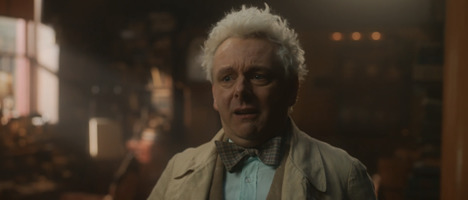
The Results
In a very compressed time frame, Aziraphale has to move quickly and radically through multiple mental and emotional states. For 6000 years he has believed he and Crowley cannot be together. Suddenly, with the revelation of Gabriel and Beezlebub, that foundational belief is challenged. Before he can work through what that could mean for him and Crowley, the Metatron offers an even cleaner solution - they can be protected from retribution and be on the same side again. When Crowley rejects reinstatement wholesale, it makes Aziraphale feel that he and his loving offer of a life together have been personally rejected. Then that rejection is further confused through the shocking experience of the kiss which Aziraphale does not have adequate context for or time to understand and integrate. In his emotional turmoil, Aziraphale falls back on his default crutch for dealing with sadness and anger - forgiveness - which further cuts him off from Crowley. Taken all together, this is a tumultuous rollercoaster of whiplash emotions that pull at every part of Aziraphale's self- and world-views.
Compared to what Crowley is going through, I think Aziraphale is going to have the tougher road in Season 3. Crowley may still need to better reconcile and integrate his feelings for Aziraphale, but Aziraphale has 6000 years of foundational ideology to challenge and evolve to reach a place where he and Crowley can be together as their authentic selves.
#good omens#aziraphale#crowley#aziracrow#ineffable husbands#good omens meta#good omens 2#gomens#essay#final 15#crowly x aziraphale#good omens s2#good omens season 2
1K notes
·
View notes
Text
Aziraphale and Crowley's relationship dynamic fascinates me and what fascinates me even more is how people perceive them, partly because I seem to have a much more optimistic view of their dynamic than a lot of what I read suggests they do.
With that in mind I started trying to unpick how I see their dynamic and why and what I ended up with was a series of rambles on various aspects, including confidence, trust, silliness and what they ask of each other. This one is about what they ask of each other and why their relationship isn't some weird one-sided thing where Crowley gives Aziraphale everything he could possibly want or ask for.
I see a lot of posts and things suggesting Crowley always rolls over and does anything Aziraphale asks of him. I don’t know to what extent most people really believe this or if it’s just a fun joke (and I’m not saying that’s bad, I think it’s a fun joke too, I love reading all that stuff and it makes me laugh). The point I wanted to make here though is that I don’t think it’s true and also why I don’t think it’s true.
Everything from here on out is my opinion, but I won’t keep stating that in order to make it more easily readable, just take it as a given. If your opinion is different that’s absolutely fine, I love that we can all see this stuff in different ways depending on our experiences and personalities, it’s why the fandom is so fun. (It’s also why my opinion on so many things in season two ricochets wildly from one theory to another).
So back to Crowley and Aziraphale – I don’t think Aziraphale walks all over Crowley, or certainly not to the extent that people sometimes think he does. Also Crowley doesn’t and wouldn’t allow himself to be walked all over anyway. Why is this even relevant? Because I’ve seen people say that in the final 15 minutes Aziraphale finally asked Crowley to do something that pushed him over the edge and that Aziraphale was shocked when Crowley didn’t roll over and do it because Crowley always does what Aziraphale asks. This isn’t at all true for a start, but also this view tends to include a second assumption, which is that their relationship is one-sided and Aziraphale never does anything for Crowley, that he dismisses him and takes him for granted, which also is not true in a lot of ways. I think it’s a fundamental misinterpretation of their relationship dynamic.
First of all why can Crowley’s actions be interpreted as just rolling over and doing whatever Aziraphale wants? Well, the answer to that is three-fold – firstly Crowley is a genuinely unselfish in many ways, he does things for people because that’s the way he is, it doesn’t make him a pushover, it just makes him nice. Secondly he loves Aziraphale deeply. Whether he knows it or not doesn’t matter, he cares for Aziraphale and wants him to be happy. This isn’t the same as being a complete doormat, it’s simply compromising with the person you are in a relationship with and occasionally prioritising them over yourself. Both these things come together in the third thing, which is that Crowley’s love language is acts of service – he enjoys doing nice things for Aziraphale, he enjoys rescuing him, or going along with him and letting him have his own way, so why not do it? The point is he’s never railroaded into it by Aziraphale, it’s always a deliberate choice. He is literally saying, I will do this thing for you because I love you and I enjoy making you happy and this is something I feel I can give to you.
How does Aziraphale see this behaviour?
Well that’s a tricky one, because in many ways Aziraphale is the more complex character, not least because he changes the most over the course of their history together. Is there a slight element of him taking Crowley for granted in some of their interactions, especially in season two? Possibly, but mostly I don’t think that’s it at all. When someone gives you things because their love language is acts of service you develop a (mostly sub-conscious) confidence in that relationship dynamic and if you also have confidence in yourself (which Aziraphale absolutely does – I’ll write more on this another time) then when you want something you ask for things. You ask not because you learn to expect, but because you think you’re worthy of asking and you think that your relationship is strong enough to stand up to the ask. I ask my husband for things all the time, sometimes they’re things I know he’ll give me – these are easy asks (I don’t just mean physical objects, I also mean acts of service such as helping me with something), sometimes though I’ll ask for things knowing he probably won’t give me that thing or without having a clue what his answer will be – these are harder asks, the sort you don’t do early on in relationships because they might break it either in one go or over time. Sometimes a hard ask results in me getting what I want, sometimes it results in a bit of back and forth before I get what I want, sometimes I get a no and I’m temporarily annoyed or upset, sometimes I get a no and I accept it because I knew it was the most likely outcome.
The point is that I ask, and so does Aziraphale. You ask because you have confidence that you are worthy of the ask and also that your relationship is strong enough to bear the request, even if the answer is no. Can a no still be annoying or upsetting? Yes absolutely. Can a no still be wrong on the part of the other person? Also yes. The point is that sometimes the no isn’t wrong and it doesn’t necessarily break the relationship. By the time season two comes along Aziraphale is confident enough in his relationship with Crowley to feel it can bear the weight of him asking.
So what happens when he asks? Does Crowley roll over?
Well no, he doesn’t. One big example of this is right at the beginning of the series, in episode one. Here Aziraphale makes a massive ask of Crowley and he knows it’s a big ask. Even before he tells Crowley what the problem is he’s aware of the possibility of a no. “Is it something I can help you with?” Crowley sayss, and Aziraphale merely shrugs. It’s not because Nina is there, she’s gone by that point. It’s also not because he doesn’t have faith in Crowley’s ability to help him, he always has faith in Crowley’s abilities (this is a whole other thing on trust). What he’s doubting is whether Crowley will help him. It’s why they’re meeting in the café, not the bookshop. He wants to break this one to Crowley a bit at a time – there’s a problem and I need help. I want your help, it’s why I called you, but you aren’t going to like it and I’m not even sure whether you will help so I’m establishing that I need help first, rather than showing you Gabriel immediately, so that you aren’t completely surprised when I present the whole problem to you.
Once they go to the bookshop and Crowley is confronted with Gabriel he offers the help he feels able to give by saying that he’ll drive Gabriel somewhere and dump him. He’s stating his willingness to help (which is important later), but for now he’ll only help in one specific way. What he isn’t willing to do is any more than that, not even for Aziraphale.
Help me take care of Gabriel. Help me sort this mess out, Aziraphale says, and what does Crowley say? No. Absolutely not. You’re on your own with this one. Even after Aziraphale practically begs him for help, complete with puppy dog eyes and the magic word, “I’d love you to help me,” Crowley still says no. That is not the reply of someone who lets themselves be walked all over or who rolls over every time the angel they’re in love with flutters their eyelashes.
Okay so what about the fact that he returns? Well, the stakes have been raised: for a start Aziraphale is now directly in danger, which alters the balance in favour of helping him, and remember he was already willing to help, he said as much, but he was previously only willing to help in one way. Now that’s changed. Doing things you wouldn’t normally do for someone you love when the stakes are raised is a perfectly normal rection in a relationship and does not indicate an unhealthy dynamic. Crowley has now realised that getting rid of Gabriel is no longer an option - his preferred plan (dumping Gabriel somewhere) will no longer work, so the only choice is now Aziraphale’s plan of keeping him in the bookshop and taking care of him.
This is why he returns.
A quick note on the call
Just backtracking a bit here – when Aziraphale calls Crowley to ask him for help Crowley agrees to be over in two minutes. It’s instant, no questions asked and at first glance looks like Aziraphale calls and Crowley comes running just because. But nope. Later we are very clearly told that Crowley knows something is wrong the moment he picks up the phone and Aziraphale starts speaking, “This was your ‘Something’s Wrong’ voice.” Crowley already knows there’s a problem and what do you do when your closest friend calls you and tells you about a problem? You try to help. Whether that’s advice, comfort, physically going around to help out or whatever the situation calls for. Of course Crowley says he’ll be there in two minutes, he doesn’t exactly have anything else on and his friend has just indirectly told him something is wrong. He’d be a pretty shitty person/entity if he didn’t agree to drop round and try to help.
So what about the 'I was wrong' dance?
This whole interaction, that many people say indicates how under the thumb he is actually shows us the exact opposite. What’s the first thing Crowley says when Aziraphale asks him to do the dance? “I don’t do the dance.” This tells us a hell of a lot about their relationship dynamic up to this point – for a start Aziraphale has clearly done the dance before, at Crowley’s request, and he lists off the occasions. The dance is silly and slightly demeaning and Aziraphale has done it several times for Crowley, whilst Crowley has never done it, yet somehow we read this whole scene as Crowley being the whipped one? Um. No. Also heavily implied in Crowley’s, “I don’t do the dance” statement is, You’ve asked me to do this before, I’ve always said no because I don’t want to. You’ve always accepted my no before and I want (expect!) you to accept it this time.
But this time Aziraphale doesn’t accept the no. Just like Crowley wouldn’t go along with his plan earlier, Aziraphale now won’t go along with Crowley’s no. Clearly he has done so in the past, but this time their dynamics are different. They’ve been much more open about their friendship for the past four years, they’ve both accepted that they are at least close friends, if not more. They’ve saved the world together and saved each other. They both acknowledge they “carved (this existence) out for ourselves” and that brings strength to their relationship. Now that Aziraphale has more confidence in what they are to each other, he takes that confidence and tests the limits of what Crowley will do for him, to push them more towards equality. Why should he always be the one to do the dance? Crowley responds by acquiescing not because he would just roll over and do anything for Aziraphale but because he recognises three things. Firstly that Aziraphale is pushing and that this is new and that this means something to him in the context of their relationship, secondly because he reluctantly accepts Aziraphale’s point that it isn’t really fair that he never does it, and finally because the request for him to do the dance isn’t about him refusing to help (Aziraphale was never certain he would), it’s about the fact that he’s broken Aziraphale’s trust by refusing to help (which is a slightly and very subtly different thing). To illustrate this, right before Crowley does the dance, just after he says “fine,” he gets this very brief, soft look on his face – this is him acknowledging to himself that Aziraphale deserves this dance, that he loves the angel and that he’s doing this because of both those things – he could have continued to insist on a no, he clearly has before, but this time he chooses not to.
I will do this thing for you because I love you and I enjoy making you happy and this is something I feel I can give to you.
All right, what about the car thing?
What about it? Lending your car to the person you love is very normal. Ok so the car means more to Crowley than a normal car does to us, but the point still stands. Aziraphale is making a reasonable request here. Does he expect a yes? Absolutely, because he also knows it’s a reasonable request given where their relationship is. Does he flirt to get his own way? Hell, yes. Does Crowley know exactly what Aziraphale is playing at? Also a hell yes. And Crowley totally plays up to it, he’s not as opposed to it as he claims. He’s playing up his “no” and his grumpiness for effect, to encourage Aziraphale’s silly flirtiness. Look at the difference between this no and the no he gave Aziraphale earlier. There’s no anger here, there’s no real sense that he thinks Aziraphale is asking too much, he’s playing a role in their relationship and they’ve both played this game before. Look at that little slap of the hand, which Aziraphale responds to equally playfully. The game even continues after Muriel turns up at the shop, when it’s already quite clear that Crowley is going to let Aziraphale use the car (he’s already taking the plants out). Even in the back-room Crowley still teasingly grumbles about trains whilst Aziraphale smiles flirtily, and Crowley playfully withholds the car keys when Muriel interrupts them. They both know Aziraphale is going to end up with them, there’s no point to him not directly handing them over in spite of the interruption, it’s just an excuse to tease Aziraphale back. I mean, look at him – he spends the rest of the conversation wiggling his hips, grinning smugly and confidently handling the Muriel problem by talking about love. Aziraphale’s very overt reaction tells you all you need to know about the dynamic of this one.
Two can play at this flirting game, angel.
But he follows him around like a little puppy!
Well, yes and no. Sure he follows him around whilst he goes around asking all the shopkeepers to the meeting, but he does that because it’s fun for him. He’s curious, Aziraphale is acting oddly, doing something he’s never done before and Crowley wants to know what it is. He’s always found him fascinating – what silly and ridiculous thing is the angel up to now?
Also wanting to hang out with the person you are in love with isn’t at all strange or a sign you are in some sort of weird relationship where only one of you calls the shots. It’s normal. Crowley knows Aziraphale has a tendency to be silly or do unexpected things and he wants to watch him do them and also flirt with him whilst he’s doing them. Looking grumpy and reacting to Aziraphale’s silliness with disbelief is how Crowley flirts-without-flirting. Both of them know, understand and like that dynamic, and he has that role not because he’s unhealthy levels enthralled with everything Aziraphale does but because of the levels of trust they have spent millennia establishing.
What Crowley doesn’t do is wait around for Aziraphale. Look at the scene where Aziraphale daydreams about Job. In that scene he’s aware Aziraphale has something else to show him (the record clue), but he doesn’t stick around whilst Aziraphale ignores him. He could have sat down somewhere in the shop and waited – he’s got an eternity, waiting an hour or so is no big deal, but waiting around like that would suggest he really is a doormat, just waiting for the next time Aziraphale shows him any attention. He doesn’t do that, instead he goes off and does… well, something. There’s a lot of speculation over what it is, but whether he goes off to read Pride and Prejudice or just wanders off to find something more interesting to look at than the back of Aziraphale’s head, he’s clearly saying here that he has a life outside of whatever Aziraphale wants to do.
Also side note - you know what else he doesn’t do for Aziraphale? Adjust his driving style. Aziraphale clearly hates it, it makes him nervous and he even asks Crowley to change several times whilst they’re in the car together, but Crowley never does. This is how I am angel, accept it or don’t, but this is the line and I’m not changing this for you. Related to this is his refusal to accept Aziraphale altering the Bentley. Aziraphale tries to persuade him, “But it’s pretty,” and Crowley really isn’t having it. It’s another hard line and he’s not going to let Aziraphale cross it.
Anything else?
There’s a few other examples that I’ve seen listed in the, “Crowley does whatever Aziraphale says/wants” evidence piles. Things like Aziraphale assuming he’s going to get the drinks in the pub. Well, someone has to get them, and it makes perfect sense that they both assume it’s Crowley here because he’s the one more comfortable with pubs. Having a role that you take on within certain situations in a relationship is healthy and normal, imagine how exhausting it would be to debate who is going to do every little thing all of the time.
In the first series the coat cleaning is another example often cited, but this is something Crowley is perfectly happy to do. Aziraphale is flirting, which is delightful, and he’s not being asked to do anything difficult or dangerous. I will do this thing for you because I love you and I enjoy making you happy and this is something I feel I can give to you, which is totally different from, you always ask, I always give, and you always take.
What about Aziraphale. When does he give?
All the damn time. We just don’t notice it as much because Crowley asks different things of him. His love language is acts of service towards others, but he doesn’t really ask or require them in return. Sometimes he gets them from Aziraphale anyway (Holy water anyone?) Also notably in the Globe Theatre when he’s clearly the one pushing the Arrangement, and Aziraphale more or less agrees to do his work for him (“That doesn’t sound like hard work”) even before he’s asked, before they’ve gone through their little dance of Crowley pushing and Aziraphale supposedly-reluctantly agreeing.
The other things Aziraphale gives Crowley are much more nuanced, and much less measurable to us as the audience, but he gives them constantly, or more or less constantly, throughout their relationship. He gives him acceptance (although he occasionally partially withdraws it, such as in the bandstand scene), his silliness (which is more important than it first appears), a safe space (not just the bookshop, but also a safe space for Crowley to air his real views without fear of consequence, which is important irrespective of whether or not he persuades Aziraphale to agree with him), his physicality (by 1826 he’s really in Crowley’s space so much of the time) and most importantly he gives Crowley himself. Crowley constantly pushes Aziraphale to grow as a person, it’s one of the original reasons he entertains developing a friendship with him. What he asks of Aziraphale is for Aziraphale to think – really think – about what he believes. And Aziraphale does so, but only for Crowley. Humans have constantly questioned religious beliefs throughout history, they’ve written books, made speeches and even had wars over religious doctrine and the problems, inconsistencies and absurdities within it. Crowley is saying nothing to Aziraphale that he won’t already have indirectly heard from humans and dismissed or ignored. But when Crowley says it, he thinks and he changes. That’s what Crowley asks of Aziraphale and it’s what Aziraphale gives him.
What was the point of all this waffle?
Well, honestly there isn’t much of one. Only that their relationship is much more balanced than some suggest and I think I just wanted to spell that out. It also has an implication for the final 15 minutes. There’s no way Aziraphale goes into that with some sort of fake confidence that he can persuade Crowley to follow him to heaven simply because Crowley always follows him – Crowley doesn’t, he has very clear limits that he enforces with Aziraphale and Aziraphale knows this. He might feel confident for other reasons (such as thinking Crowley will be happy to be an angel again) or something else entirely different might be happening (so many theories!) but I’m pretty sure it’s nothing to do with thinking Crowley always does what he asks, because he very clearly doesn’t.
It's also why Crowley waits around afterwards to watch Aziraphale leave. It’s a way indirectly of saying one final time, I love you and I enjoy making you happy… but this is something I cannot give to you.
#good omens 2#good omens#good omens meta#apology dance#ineffable husbands#ineffable fandom#acts of service#crowley loves aziraphale#aziraphale loves crowley#aziraphale#crowley
2K notes
·
View notes
Text
On how much Aziraphale has learned since season one:
This is about character development. Inside of a story, everything that happens, happens for a reason. It's meant to tell you something, to teach you or the character of your story, something.
So if the story continues and your character repeats the same mistakes again you know that they are bound to be doomed this time, and even worse the audience is going to certainly lose respect for them, cause they have made the same mistake twice, they haven't learned anything, they're gonna do it again another time, they don't deserve a happy ending. (yes I'm talking about good omens here) So you don't do that to a character that matters to you and you respect even the tiniest bit.
A Lot of us here are thinking that this is what has happened to Aziraphale's character at the end of season two, that he has done it again, repeated the same mistake again and has left Crowley to join heaven and it's been because of reasons like wanting to change Crowley (not true, see this post), still believing in heaven's goodness (not true at all), not being on the same page with Crowley (I'm gonna talk about this one especially in this post) and such likes. But these are the things he should've known better about after 6000 years and all the events that we've learnt about especially throughout season two. (It seems to be rather the whole point doesn't it?)
But we all seem to rather believe that he's made that mistake again nonetheless. so what we're doing here is trying to find reasons to justify the mistake and somehow make the reason behind the wrong actions something relatable to ourselves so we can forgive him when the time comes.
In fact I don't believe that he's made a mistake. for Aziraphale's character to be redeemable, what he has done, must be the only option that he's had for saving them both. I don't care what kind of situation could have resulted in him making this decision, but the only reason, the one and only reason, must be his love for Crowley. Otherwise it'll prove that he hasn't learnt his lessons or doesn't love Crowley enough to make a compromise, and in both cases, he's not worthy of love. He won't earn his happy ending by being tortured and feeling sorry and doing the apology dance for Crowley if he's hurt Crowley out of selfishness and stupidity again
But I'm sure he'll earn his happy ending and I'm sure he's learnt his lessons and it's too late for him to have unlearned them all in a matter of a few seconds. (He is an idiot but he's not stupid) and it's mostly because of this, that I believe the reason why he made that decision, must be very different from what it appears to be on the surface.
Anyway, this post is about what Aziraphale has learned and how he's changed.
I have made a post about their moments of conflict from both season one and two, it's here and you can look it up. This is where you begin to understand how Aziraphale has changed since season one because these are his dialogues after he's had a fight with Crowley in the bandstand, season one:
"even if I did know where the antichrist was I wouldn't tell you we're on opposite sides"
"friends? We're not friends. We are an angel and a demon. We have nothing whatsoever in common. I don't even like you"
"there is no our side Crowley. Not anymore. It's over"
And then there's season two, when they disagree on what to do with Gabriel, Aziraphale is the one to point out that they both rely on the life they've built together
He's asking him to help him take care of Gabriel together and in response Crowley leaves
In the final scene he asks Crowley to come back to heaven
"work with me" "We can be together as Angels, Doing good" "I need you."
He says anything he can think of literally to convince him to stay with him and it doesn't work
We start from "we're not friends" and arrive at "work with me. we can be together"
Even if we don't know the reason why he's insisting on taking Crowley back to heaven with him, this is an Angel that has picked up the pace. That wants them to be an us. No matter what.
But these are only a few dialogues. I think there's more than that. I think the show in five and a half episodes (out of six) has tried its hardest to make the point quite clear about how Aziraphale feels about Crowley (or how strongly he feels those emotions). all through the way he looks at him and through his gestures and soft touches from time to time
I'm gonna make another post of those moments separately and I'm gonna link it to this when I do.
update: (here's the post. not just average moments of Aziraphale looking cute, it's something about the way he looks at him)
And I'd like to even compare those wishful glances to some of those from season one, but I can't, cause they are nonexistent in there.
#remember season two is a test of faith guys#we're the job in this one#neil liked this#good omens#good omens 2#gos2 spoilers#good omens spoilers#gos2#good omens season 2#aziraphale#crowley#ineffable husbands#aziracrow#gomens#gomens 2#neil gaiman#good omens season 2 spoilers#good omens season two#good omens thoughts#good omens analysis#good omens meta#gos2 theory
2K notes
·
View notes
Text
can I just say. coffee theory is stupid and completely cheapens the choice Aziraphale makes.
Aziraphale continues to say no to Metatron's offer until Metatron uses the real bait: if you take over Heaven, you can reinstate Crowley to his Angelic status. And that is what gets Aziraphale to say yes hook line and sinker — he can take Crowley with him so Crowey doesn't have to be afraid of Hell and Aziraphale can run things Do It Right as the Head of Heaven and no one would say anything to Crowley ever again if Aziraphale was on his side. Aziraphale doesn't know about the trial and the fact that Gabriel was fired for disagreeing w Heaven on the Second Armageddon front. He just thinks Gabriel was fired bc he fell in love w a demon (and Aziraphale's in love w a demon). Aziraphale strongly believes that if he can reinstate Crowley as an angel again then there would be no such objections from Heaven at all, because they would both be on the same side and they can be together and if anything ever goes wrong, both Crowley and he would be protected under Aziraphale's position as the new boss of Heaven. Plus, the way he remembers it, Crowley enjoyed making things creating things and still likes to do good deeds which he gets in trouble for if Hell finds out, but he won't if he's an angel, in Aziraphale's eyes then Crowley would be free to do all the good he liked. And because Aziraphale would be the boss, Crowley would be able to ask questions and work with him and make things better w his inquisitive perspective, something Crowley always wanted to do and Aziraphale wants to give him that also.
He doesn't know the full depth of things that Crowley knows, which is why when Crowley hears Aziraphale's offer, all he hears is that Aziraphale is choosing Heaven, after everything they have done to him, Aziraphale is leaving Crowley FOR Heaven. The way he sees it, Aziraphale wants him to change and be Heaven's definition of "Good" so they can both be in Heaven, conforming to a life Crowley left behind long ago, a life he knows Aziraphale wouldn't be happy in either. Which is the killing blow to Crowley's heart bc Aziraphale would choose THAT instead of coming away with Crowley? Devastating. But he doesn't know that Metatron's offer WAS Crowley's Angelification and hence forth security that got Aziraphale to say yes. Crowley hasn't communicated a lot to Aziraphale but Aziraphale also hasn't communicated a lot to him either and they're both on very different pages w the information they've got and what they feel they need to do to be together and be safe and happy.
Does Aziraphale make the naive choice? Yes. Does he make so in full control of his mind and senses? Also yes. Having his coffee poisoned is an incredibly cheap tactic because as a writer it's a cop out. It robs Aziraphale of not only his agency but also the reasonings behind his choice. It absolves him from the struggles and consequences of his actions and robs him of the growth and realization and epiphany he will have in the third act. It cheapens their inevitable reconciliation.
Metatron didn't hand him the coffee to poison him. He handed it to him so he can use the manipulative familiarity of "oh look i brought ur coffee order, isn't it cool how I know your coffee order isn't it nice how we are close like that?" that was the tactic. to get him to listen. Not some elaborate coffee poison.
#good omens#good omens meta#cant believe im having to actually write this.#high school english class. a thousand high school english classes for you clowns.#aziraphale#crowley#good omens 2#good omens spoilers#aziracrow#ineffable husbands#coffee theory#bc i am a coffee theory hater bc is straight up stupid.#ANYWAY.#learn to accept characters u enjoy will do things that are wrong and hurt.#u will have more fun that way.
3K notes
·
View notes
Text
Ok, so I wanted to do a deeper dive into this particular passage of Good Omens:
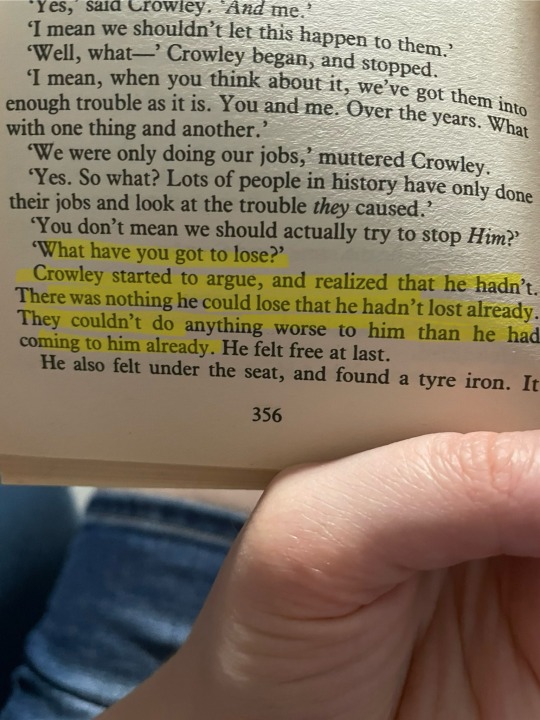
For context, this is at the climax of the book, they’re at Tadfield airbase, the horsemen have been dispensed with, Aziraphale has his body back, and Satan is about to claw his way out of the pit.
In most of the proceeding chapters involving Crowley it talks a lot about how scared Crowley is. He is very scared of Hell.
One could perhaps say maybe he is scared of them due to The Arrangement, but that is never explicitly stated. I think it has more to do with Hell is bad, and Crowley has spent the majority of the book being yelled at by some entity through the radio or TV telling him how he’s going to be in super amounts of trouble when they get their hands on him. He is just scared of what will happen. When he comes across the book shop burning he doesn’t cry for his lost friend. He curses Aziraphale, and I think it’s because the one person who may have been able to keep him safe and protected from Hell is now gone.
So when he thinks to himself (as shown in the above screen shot) that there is now nothing left for him to lose, this is why I never thought (upon reading the book the first time that is) there were any romantic feelings between him and Aziraphale. I know that technically he had already lost Aziraphale. But by this point he was back again, and back in his body. If there truly were romantic thoughts between them surely the idea of losing him again would come up.
I have read so much fanfiction, some old, some new, and what they all have in common is the detailed inner monologue of Crowley’s turmoil over his feelings for Aziraphale and how he doesn’t feel like he can act on them. In the book we get nothing of the sort, from either character. Even when they’re separated there is hardly ever any description of them thinking of the other except occasionally to frame a short reference to something. Reading the book I never got the impression that there was anything more than two ethereal beings spending time and proximity to each other and doing work for each other for no other reason than they’re essentially a bit lazy.
I think they’re only queer coded for the fact that there’s the line about Aziraphale appearing “gayer than a tree full of monkeys on nitric oxide”, and Crowley is, well, very Freddie Mercury coded. Them being seen as gay together and all the gay slurs in the awful racist scenes of Aziraphale body hopping about in culturally indigenous people after the bookshop fire has more to do with the very typical 80’s/90’s trope of “being gay = comedy gold”, than them actually being together romantically.
I think the reason why they were shipped so much after the publication however is for the same reason we ship so many male couples (or female couple) in modern media, why we’ve always shipped them: because of the complete and horrid lack there of, of proper queer representation.
If you’ve ever seen the magnificent Russel T Davies TV series It’s a Sin, there is a wonderful scene where the character Ash starts a job in a school library and the headmaster asks him to go through all the books and find any book that has queer love scenes so they can be removed. Ash then gives a most beautiful and impassioned speech (albeit it turns out the speech is just in his head) of how there is nothing. Absolutely nothing. There is nothing to the point where they are nonexistent. They are invisible. They are not seen. (Or like, something to that effect. I tell you though, it’s bloody brilliant).
So I think that’s rather the point really. You have two iconic characters, albeit supporting bit characters practically, and I think a lot of our minds automatically get drawn to wanting to put them together because of the sheer lack of queer couples. People have been doing it for years from Frodo and Sam, to Harry Potter and Draco (or Ron I guess), to Sherlock and Watson (even before the Benedict Cumberbatch show. Also as an aside let’s not get into how obsessed people got about Sherlock Holmes back in the day when those books were first published. The obsession was the reason Doyle killed the character off the in first place, then after getting letters from people telling him they were literally going to kill themselves, the reasons why he resurrected him again. Don’t tell us that modern day nerds are weird and obsessive. We’ve ALWAYS been like this).
It’s for this reason why queer representation is so god damn important. Why I still support the idea of Good Omens season 3. Because regardless of how the characters were originally intending to be represented in the book, it’s very clear now that they are so much more than “Just friends”. And we NEED that! Whether you subscribe to the idea that they will be physically intimate with each other, the fact remains is they love each other. They love each other immensely. And that comes from years of Terry Pratchett (and the other guy) accepting that canon and telling fans that it’s true. Because Michael Sheen made a choice and held a belief about how he saw his character and then David Tennant followed suit. That literally tens of thousands of fanfiction writers have decided the same.
So that’s my take. I don’t think loving each other was ever intended that way in the book, but in the last 35 years their story has morphed into the ineffable husbands that we now know.
What are your thoughts? Have I rambled on long enough to make any sense? Do you agree? Have I missed something completely obvious and gotten it all wrong? Keen to hear thoughts.
#good omens#book omens#crowley#aziraphale#ineffable husbands#aziracrow#good omens fandom#crowley x arizaphale#david tennant#Michael Sheen#Terry Pratchett#fire neil gaiman#good omens discussions
252 notes
·
View notes
Text
I think Crowley falls into two of the classic pitfalls of people who see that the problems are systemic long before anyone else around them does: impatience and despair.
(Yes yes I know, “Crowley was an optimist.” Book Crowley is an optimist. I don’t think that line is particularly useful for analyzing TV Crowley. Stay with me here.)
Let it be said that 95% of the time, Crowley has the patience of a fucking saint (ssh don’t tell him) around Aziraphale. He knows that Aziraphale needs to build his little plausible deniability rationales in order to do something that they both know he wants to do (because it’s right or simply because he would enjoy it) but Heaven wouldn’t approve of. And most of the time, Crowley is happy to help Aziraphale get there, asking the questions Aziraphale is afraid to ask, offering excuses and justifications until Aziraphale finds one he can accept. He does a lot of work of parsing out when “no” means “you haven’t convinced me yet, keep trying” and pushing through all the “I’m an angel, you’re a demon, we’re on opposite sides and mine is the good one” talk that Aziraphale gets up to all the way through s1. Because he knows that Aziraphale doesn’t really believe that stuff, right? He just needs some time to talk himself around his own cognitive dissonance, and most of the time Crowley is not only happy to facilitate that but sees it as part of his role in their relationship.
But then when the chips are down and Aziraphale is still dithering, that’s when he gets frustrated, because HOW CAN YOU NOT SEE what’s been blindingly obvious to Crowley for millennia, that Heaven is just as cruel as Hell and no one is going to step in and fix it because the system is working as intended. And that’s when he says things like “how can someone as clever as you be so stupid?” Which is a surefire way not to convince the person you’re arguing with of anything.
And then there’s the despair. I really think the running away thing is not about cowardice or selfishness or some kind of unhealthy level of avoidance of hard or scary things, but about hopelessness. They’ve spent their lives avoiding very very real danger, and of the two of them Crowley is much more constantly aware of the danger that they are in from both sides. Yes he’s hypervigilant but he is also almost always right about the amount of danger they are in. Trying to get as far away from danger as possible is not an irrational response, even if it’s not always the correct one for a given situation.
When you feel like you’re the only person who sees how rotten the system is, how it needs to be dismantled entirely, but you are also VERY aware of how strong the people in power are and how ruthless they are about crushing dissent because you experienced it personally…well that gets fucking depressing after a while. Because even if you think the whole system needs to go, that feels like a completely unattainable goal when it seems like no one else even sees the problem, or if they see it, they are too afraid to do anything about it. And can you blame them? You know exactly what happens to people who speak up.
So it’s very easy for your goals to shrink from systemic change to just taking yourself and the people you love and finding somewhere for them to be as safe as possible, for as long as the system will let you exist. Because reforming the system is a fool’s errand, and dismantling it entirely seems impossible. I think this is where Crowley is at. Even if on some level he knows it’s an imperfect solution, because both of them have enough compassion that they would feel guilty abandoning Earth and humans to save themselves, and because Heaven and Hell really can find them anywhere in the universe. He just doesn’t see another option.
And look, I think Aziraphale is 100% wrong that Heaven can be reformed. But he is not wrong to want to stay and fight to make things better, even if it means sacrificing the Earthly comforts he loves so much, and even if it means doing it without Crowley by his side.
Ultimately they both need each other. Aziraphale needs Crowley for his willingness to ask questions and to see the scale of the problem, even if it’s terrifying. But Crowley needs Aziraphale for his hope, his stubborn determination to believe things can and should be better, and to fight for that. In the right hands, hope is an enormously powerful weapon.
2K notes
·
View notes
Text
Putting the Meta in "Metatron"
(couldn't resist the pun, sorry)
Ok, this has been tickling my brain for a while. I've been thinking about how The Metatron designed his role and discourse specifically to manipulate Aziraphale into the end result we saw in the last minutes of S2. I become obsessed with it because… well, I'm a bit obsessive, but also because there were many really smart writing decisions that I loved (even when I despise The Metatron exactly for the same reasons. Hate the character, love the writer). If you haven't watched Good Omens Season 2, this is the moment to stop reading. Come back later!
We already know that in Book Omens, the role of Gabriel in the ending was occupied by The Metatron. Of course, the series introduced us to Gabriel and we won a lot by that, but I feel that the origins of The Metatron should be considered for any of this. He is not a "sweet old man": he was the one in charge of seeing over the operation of Armageddon; not just a stickler of rules, but the main promoter for it.
However, when he appears in the series finale, we first are primed to almost pass him by. He is in the line for buying coffee, using clothes that are:
obviously not tailored (almost ill fitted)
in dark tones
looking worn and wrinkled
This seems so important to me! All the angels we have seen are so proud of their aspect, wear clear (white or off white) clothes, pressed, impeccable (even Muriel), even when they visit the Earth (which we have already seen on S1 with all the visits to the bookshop). The Metatron chose a worn, comfortable attire, instead. This is a humanized look, something that fools all the angels but which would warm up someone very specific, can you guess?
After making quite a complicated coffee order (with sort of an affable and nervous energy), he makes a question that Crowley had already primed for us when asking Nina about the name of the coffee: having a "predictable" alternative and an unpredictable one.
This creates an interesting parallel with the next scene: Michael is discussing the possibility of erasing Aziraphale from The Book of Life (a punishment even worse than Holy Water on demons, because not having existed at all, EVER is definitely worse than having existed and ceased to exist at some point) when The Metatron arrives, interrupts the moment and signals having brought coffee. Yup, an amicable gesture, but also a "not death" offering that he shows clearly to everyone (even when Michael or Uriel do not understand or care for it. It wasn't meant for them). He even dismisses what Michael was saying as "utter balderdash" and a "complete piffle", which are the kind of outdated terms we have heard Aziraphale use commonly. So, The Metatron has put up this show for a specific audience of one.
The next moment on the script has Metatron asking Crowley for the clarification of his identity. Up to this moment, every angel has been ignoring the sprawled demon in the corner while discussing how to punish Aziraphale… But The Metatron defers to the most unlikely person in the room, and the only one who will push any buttons on Aziraphale: Crowley. After that, Aziraphale can recognize him, and Metatron dismisses the "bad angels" (using Aziraphale's S1 epithet) with another "catchy old phrase", "spit spot", while keeping Muriel at the back and implying that there is a possibility to "check after" if those "bad angels" have done anything wrong.
Up to this moment, he has played it perfectly. The only moment when he loses it is when he calls Muriel "the dim one", which she ignores… probably because that's the usual way they get talked to in Heaven. I'm not sure if Aziraphale or Crowley cared for that small interaction, but it is there for us (the audience) to notice it: the sympathy the character might elicit is built and sought, but he is not that nice.
After that, comes "the chinwag" and the offer of the coffee: the unnecessarily complicated order. It is not Aziraphale's cup of tea (literally), but it is so specific that it creates some semblance of being thought with care, and has a "hefty jigger" of syrup (again with the funny old words). And, as Aziraphale recognizes, it is "very nice!" (as The Metatron "jolly hoped so"), and The Metatron approves of him drinking it by admitting he has "ingested things in my time, you know?". This interaction is absolutely designed to build a bridge of understanding. The Metatron probably knew that the first response he would get was a "no", so he tailored his connection specifically to "mirror" Aziraphale: love of tasty human treats he has also consumed, funny old words like the ones he loves, a very human, worn, well-loved look. That was the bait for "the stroll": the moment when Aziraphale and Crowley get separated, because The Metatron knew that being close to Crowley, Aziraphale would have an hypervigilant soundboard to check the sense of what he was going to get offered. That's what the nasty look The Metatron gives to Crowley while leaving the bookshop builds (and it gets pinpointed by the music, if you were about to miss it).
The next thing we listen from The Metatron is "You don't have to answer immediately, take all the time you need" in such a friendly manner… we can see Aziraphale doubting a little, and then comes the suggestion: "go and tell your friend the good news!". This sounds like encouragement, but is "the reel". He already knows how Crowley would react, and is expecting it (we can infer it by his final reaction after going back for Aziraphale after the break up, but let's not get ahead of ourselves shall we?). He even can work up Muriel to take care of the bookshop while waiting for the catch.
What did he planted in Aziraphale's mind? Well, let's listen to the story he has to tell:
"I don't think he's as bad a fellow… I might have misjudged him!" — not strange in Aziraphale to have such a generous spirit while judging people. He's in a… partnership? relationship? somethingship? with a demon! So maybe first impressions aren't that reliable anyway. The Metatron made an excellent job with this, too.
"Michael was not the obvious candidate, it was me!" — This idea is interesting. Michael has been the stickler, the rule follower, even the snitch. They have been rewarded and recognized by that. Putting Aziraphale before Michael in the line of succession is a way of recognizing not only him, but his system of values, which has always been at odds with the main archangels (even when it was never an open fight).
"Leader, honest, don't tell people what they want to hear" — All these are generic compliments. The Metatron hasn't been that aware of Aziraphale, but are in line with what would have been said of any "rebel leader". They come into context with the next phrase.
"That's why Gabriel came to you, I imagine…" — I'm pretty sure The Metatron didn't imagine this, ha. He is probably imagining that the "institutional problem" is coalescing behind his back, and trying to keep friends close, but enemies closer… while dividing and conquering. If Gabriel rebelled, and then went searching for Aziraphale (and Crowley, they are and item and he knows it), that might mean a true risk for his status quo and future plans.
Heaven has great plans and important projects for you — this is to sweeten the pot: the hefty jigger of almond syrup. You will be able to make changes! You can make a difference from the inside! Working for an old man who feels strangely familiar! And who recognizes your point of view! That sounds like the best job offer of the world, really.
Those, however, are not the main messages (they are still building good will with Aziraphale); they are thought out to build the last, and more important one:
Heaven is well aware of your "de facto partnership" with Crowley…
It would be considered irregular if you wanted to work with him again…
You, and you alone, can bring him to Heaven and restore his full angelic status, so you could keep working together (in very important projects).
Here is the catch. He brought the coffee so he could "offer him coffee", but the implications are quite clear: if you want to continue having a partnership with Crowley, you two must come to Heaven. Anything else would be considered irregular, put them in a worst risk, and maybe, just maybe, make them "institutional enemies". Heaven is more efficient chasing enemies, and they have The Book of Life as a menace.
We already know how scared Aziraphale has always been about upsetting Heaven, but he has learned to "disconnect" from it through the usual "they don't notice". The Metatron came to tell him "I did notice, and it has come back to bite you". The implied counterpart to the offer is "you can always get death". Or even worse, nonexistence (we have already imagined the angst of having one of them condemned to that fate, haven't we?)
When The Metatron arrives, just after seeing Crowley leave the bookshop, distraught, he casually asks "How did he take it?", but he already knows. That was his plan all along: making them break up with an offer Aziraphale could not refuse, but Crowley could not accept. That's why he even takes the license to slightly badmouth Crowley: "Always did want to go his own way, always asking damn fool questions, too". He also arrive with the solution to the only objection Aziraphale would have: Muriel, the happy innocent angel that he received with so much warmth and kindness, is given the opportunity to stay on Earth, taking care of the bookshop. The only thing he would have liked to take with him is not a thing, and has become impossible.
If God is playing poker in a dark room and always smiling, The Metatron is playing chess, and he is quite good at it (that's why he loves everything to be predictable). He is menacing our pieces, and broke our hearts in the process… But I'm pretty sure he is underestimating his opponents. His awful remark of Muriel being "dim"; saying that Crowley "asks damn fool questions", and even believing that Aziraphale is just a softie that can be played like a pipe… That's why telling him the project is "The Second Coming" was an absolute gift for us as an audience, and it prefigures the downfall that is coming — the one Aziraphale, now with nothing to lose, started cooking in his head during that elevator ride (those couple of minutes that Michael Sheen gifted to all of us: the shock, the pain, the fury, and that grin in the end, with the eyes in a completely different emotion). Remember that Aziraphale is intelligent, but also fierce. Guildernstern commited a similar mistake in Hamlet, and it didn't go well:
"Why, look you now, how unworthy a thing you make of me! You would play upon me, you would seem to know my stops, you would pluck out the heart of my mystery, you would sound me from my lowest note to the top of my compass, and there is much music, excellent voice, in this little organ, yet cannot you make it speak. 'Sblood, do you think I am easier to be played on than a pipe? Call me what instrument you will, though you can fret me, you cannot play upon me."
I'm so excited to learn how this is going to unfold!! Because our heroes have always been very enthusiastic at creating plans together, failed miserably at executing them, and even then succeeding… But now they are apart, more frustrated and the stakes are even higher. Excellent scenario for a third act!
*exits, pursued by a bear*
#good omens#good omens 2#good omens meta#good omens spoilers#aziraphale#ineffable spouses#ineffable divorce#narrative analysis#character analysis#the metatron#and a casual Hamlet quote#just because I love Hamlet
2K notes
·
View notes
Text
Romantic expectations and the story we didn't see: A magic trick hiding in plain sight
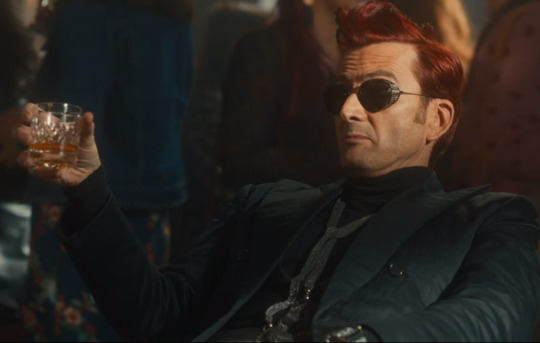
Here's a hopeful meta for all my fellow celestial brainrot sufferers out there. Cheers! :)
This idea started as a dead end, trying to track the movements of Crowley’s sideburns/tattoo because I thought time travel shenanigans were afoot. I had to abandon that theory when it was pointed out that David was simultaneously filming as the sideburns-having Fourteenth Doctor, and in-universe Crowley can do whatever he wants with his facial hair whenever he feels like it. But hey - null findings are still findings!
On the bright side, pausing the show to make notations in a spreadsheet forced me to slow down and notice other changes I'd overlooked the first time around: acting choices, costuming choices, references to book lore. And possibly a few surreptitious flicks of the wrist, in places where we’re meant to be focused on the magician’s other hand.
@amuseoffyre and @ineffablefood had a great exchange recently about romance and “the significance of misdirection and three-in-one (magic) tricks” throughout the show. I suspect Neil has done something brilliant with the audience’s long-standing expectations (since the 1990s, really) for the love story between Crowley and Aziraphale to develop. And while it is a wonderful story indeed, playing to this expectation lets Neil distract his audience from the blink-and-you'll-miss-them seeds he's planting for the final chapter.
Continued below the cut...
Let’s start at the beginning of Episode 2. First, context: In the previous installment, Crowley stormed out of the bookshop, was whisked away to Hell by Beelzebub where he learns about the Book of Life threat to Aziraphale’s existence, then returned to the bookshop to dance a little apology dance and hide Gabriel with an unintentionally massive joint miracle. In S2E2, we and Shax catch up with Crowley as he's snoozing in the Bentley.
Shax: “You’re in trouble”
A. J. Crowley, cool as a cucumber: “Obviously. Former demon, hated by Heaven, loathed by Hell. How will our hero cope?”
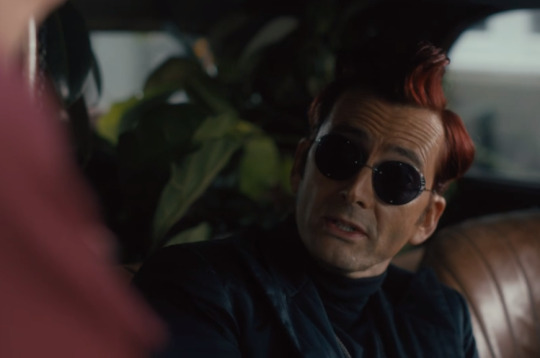
Interesting! Sarcastic? Yes, absolutely; but that’s also a good 4500 years and an averted apocalypse away from “I’m a demon. I lie,” wouldn’t you say? Someone is sounding a whole lot less depressed and aimless and navel-gazey (do snakes have navels?), and a whole lot more like he’s got a project to focus on, since his "what's the point?" ruminations on the park bench in E1.
And of course we all noticed the costume change right away. Hello, black turtleneck. Feeling cute today, thought I’d cover up my graceful long neck? That sounds unlikely. Let’s put a pin in this one.
There’s also an interesting acting choice going on here. Crowley speaks to Shax in a funny, drawling, too-cool-for-you voice that we haven’t heard in a while. Specifically, not since 1967. If you go back and give the S1E3 scene in the Dirty Donkey a listen, you’ll hear it (and if you know of another instance of it that I've missed, please let me know!). In S2E2, he keeps up this odd voice (if anybody knows what kind of affect this is supposed to be, please do tell!) throughout this dialogue with Shax, except for the brief moment when she first surprises him about the joint miracle having been detected.
1967 was a fun year. Crowley masterminded a heist! And seemed like he was having a ball doing it, right up until his little caper was called off after Aziraphale brought him the thermos of holy water. Crowley spoke to his co-conspirators in that same funny, very 60’s-caper-film voice. He wore a hip 60’s turtleneck. He bought petrol for the only time ever, so he could get those sweet James Bond bullet hole decals for his car (per the book, seen on the Bentley in the show).
Those James Bond bullet hole decals would of course have been part of a promotion for this 1967 release, which you just know our film-enjoying demon went to see in the theater:
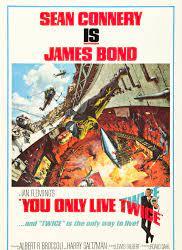
Starring this suave, be-turtlenecked guy:
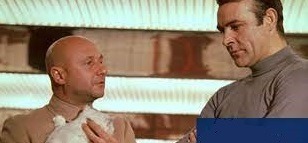
And now - begging your forgiveness - a brief rant.
There are a number of posts out there that refer to Crowley’s S2E2 turtleneck as a flirtatious sartorial choice - actually, ‘slutty’ seems to be the favored accusation. There are even a few posts floating around commenting on how sweet it is that Crowley swaps out his slutty, kinky, throw-me-over-your-desk-and-take-me turtleneck for a more dressy and appropriate collared shirt specifically to attend Aziraphale’s Jane Austen ball.
Now this is all in good fun, and Crowley does indeed look fantastic here, and I do love a good fangirling sesh as much as the next person. However, fandom’s collective tendency to interpret what we are seeing on the screen through the lens of romantic expectation can, at times, give rise to a kind of blinkered enthusiasm that obscures the original text in a haze that is part Mandela Effect, part unrestrained horniness, and part in-group code talking and identity reinforcement.
Respectfully, Crowley’s black turtleneck does not appear at all in S2E5: The Ball. In fact, it never appears again after the end of S2E2.
For Someone’s sake, let’s collectively pull our heads out of the romantic fog/gutter for a moment and focus on what we are actually seeing in the book and on the screen. For Crowley, this is an uncharacteristic within-period costume change. There is a surreptitious flick of the wrist happening here, out in broad daylight, and we are all missing it.
So here’s a thing. Aziraphale appears to have settled comfortably into life on Earth, his neighborhood, his books, using Crowley as an outlet for sharing his good deeds that he would once have reported to Heaven. Meanwhile, at first glance, Crowley appears stuck in a rut. There he slouches on a park bench with Shax in S2E1: a guy who lives in his car, stagnantly clinging to old familiar habits, mulling over the pointlessness of it all.
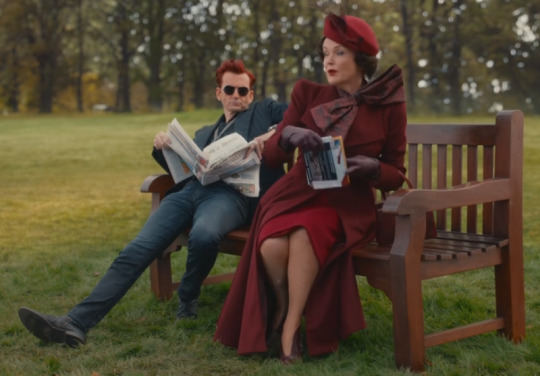
Setting aside the bit about living in the Bentley (I’m going to attribute this to well-documented issues between him and Aziraphale, discussed in many other excellent metas, and move on), Crowley has at least two very good, proactive reasons for maintaining his contact with Hell through Shax. First and foremost, it’s a source of information he can use to keep ahead of potential threats to Aziraphale and himself.
But also, I would posit…he kinda likes it.
Recall that book GO was first conceived as a parody, with Aziraphale and Crowley as spy-against-spy (but not really) field operatives in an ages-old cold war between Heaven and Hell. Their entire book dynamic is rooted in the trope of two opposing agents who have been in the field for so long that they now have more in common with each other than with their respective head offices. Their St. James’s Park meetings among other spies and ministers trading secrets are a sendup of what was once a well-known Cold War-era cliché.
Our contemporary Crowley still likes slick outfits and hellaciously expensive watches and high-performing vintage cars and pens that write underwater while looking like they could break the speed limit. He coaches Shax on how to blend in as a demon on Earth, and he helpfully redirects the wayward contact looking for the Azerbaijani sector chief. He loves improvising and getting away with shenanigans under the institutional radar. And boy golly was he impressed with Jane Austen: master spy, brandy smuggler, and mastermind of the 1810 Clerkenwell Diamond Robbery.
And if you look at it a certain way, for as long as Crowley has considered himself to be on “[his] own side” - going at least as far back as Job - he could almost think of himself as a sort of double agent. It’s actually a very romantic sort of notion, befitting our hopeless romantic of a (professedly former) demon; but it’s romantic in a very different way than we, the audience, have been primed to watch for.
In other words, in a very “on my own side” kind of way, Crowley really gets a kick out of being a spy. Or at least, dressing up and accessorizing as one, and moonlighting as a good-doing double agent when he can get away with it. And also being a plotting criminal mastermind. Two sides of a coin, really. Just look at Jane Austen.
My point is: No, Crowley did not wait around for Shax to come find him in a turtleneck so that he could go flirt with Aziraphale later. He’ll flirt with Aziraphale no matter what. No, this:
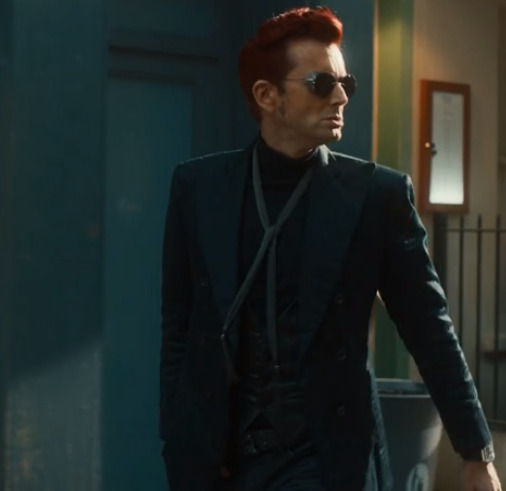
is actually this:
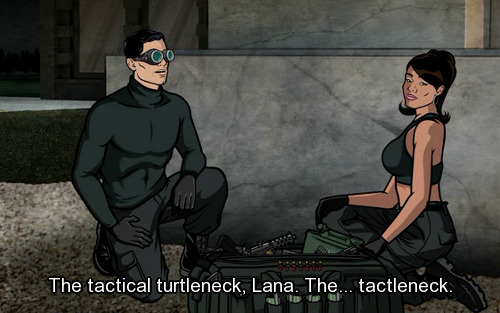
Much like the one he wears to the Dirty Donkey in 1967:
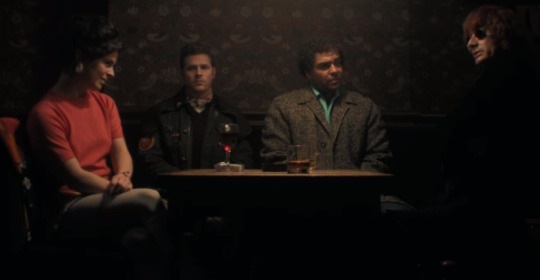
whilst holy water heist-plotting. Here's a clearer shot with gratuitous Bentley, because I love them:
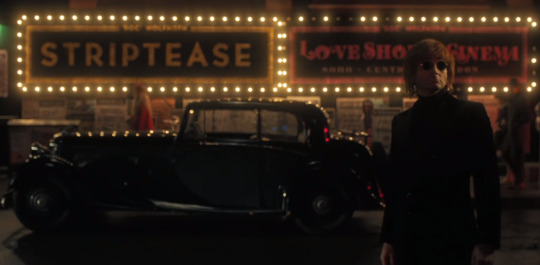
…and which he'll wear again, with appropriate camouflage, while infiltrating Heaven in S2E6:
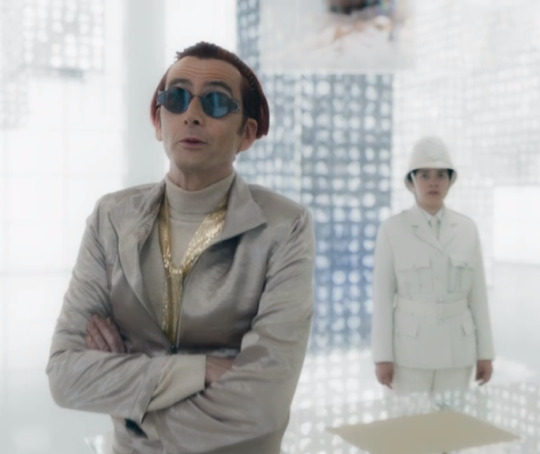
That is the 1967 planning a HEIST turtleneck for committing ESPIONAGE and STEALING THINGS in. Because turtlenecks are what modern human master spies wear to get their hands dirty - after all, he saw it in a movie once.
Crowley dons his tactical turtleneck sometime during the first major break in the action (which doesn't happen until after the joint miracle to hide Gabriel) after he learns about the threat the Book of Life poses to Aziraphale. Loverboy started mentally preparing himself to go after that book immediately upon learning that it was in play as a genuine threat.
Now let’s pick up at the S2E2 Dirty Donkey scene, reading the story from this angle. Of course, Crowley enables Aziraphale’s delusions about Heaven by hiding information from him, and does not disclose the Book of Life threat when they meet again. They go into the pub, Aziraphale shamelessly paws Crowley’s chest like the seductive Bond Girl he is, and Crowley gets to act all smooth and suave and intimidating as he chases off the interloping Mr. Brown (or Mr. Collins for the Pride & Prejudice fans, take your pick).
Ergo, theory: beginning in S2E2, Crowley is already thinking of himself as a Jane Austen/James Bond action hero (“How will our hero cope?”), psyching himself up to rescue Aziraphale by getting his spy game on and stealing the Book of Life.
Now, watch closely...This is where Aziraphale and Crowley brainstorm their plans to solve the problem they both know about: getting Maggie and Nina to fall in love and thereby get Heaven off their backs. Crowley’s vavoom plan is drawn from yet another movie (“Get humans wet and staring into each other’s eyes - vavoom, sorted. I saw it in a Richard Curtis film.”). But Crowley also implicitly shares his solution to the problem he hasn’t told Aziraphale about. And true to form, Crowley’s Jane Austen solution isn’t the same as Aziraphale’s Jane Austen solution.
Two solutions that fail by the end of Season 2, and a secret third one that might still work...and there's our magic trick of three.
‘“I’m lost. Am I doing a rainstorm?” Yes, babe. And a heist, too - just not until season three. Can I get a wahoo!?
I won’t spend time on A Companion to Owls during this meta, except to note that in all three minisodes, we get to watch stories that involve Crowley acting as a double agent on “his/their own side” - successfully making Hell and Heaven think he’s fulfilling their will while saving Job’s goats and children; failing to fool Hell when he does a good deed in Edinburgh; and of course, collaborating with Aziraphale whilst evading detection as an infernal turncoat during the Blitz.
(Because this is getting long, I'll also skip over Crowley's interrogation of Jim in this episode - I'll probably come back to that in another meta. But interrogating is a rather spy-ish thing to do.)
When we catch up with Crowley again later, he’s already slipped out of the bookshop, having left Aziraphale to his biblical reverie about Job. He saunters snakily down Whickber Street as usual, but with a very pointed and swift glance over his shoulder (see pic above). This demon is up to something - possibly something we didn’t get to see, something that may have happened offscreen while he stepped out. In any case, knowing there’ve been unfriendly angels in the neighborhood that morning, he’s rightly concerned about being spied on.
From this point until the beginning of episode six, there isn’t a whole lot of opportunity for Crowley to make any next moves. He babysits the bookshop, during which time he manages to wring some crucial information out of Jim; he follows his Crowley’s Angel around like a puppy, and downs a bottle of red like a good old fashioned lovesick boy once that’s been pointed out to him. If any plotting or scheming is underway, this occult being is keeping stumm for now.
This has been a long one, so I’ll wrap up with Crowley’s infiltration of Heaven with Muriel. The turtleneck disguise works (Archer fans, be vindicated!) long enough to gather some information that will be crucial not just to the denouement of S2, but also to Crowley’s journey in S3 (previous post on Crowley's Fall, Saraqael, and memory wiping). And Aziraphale gets to enjoy that view exactly zero times. The point isn’t oh, a turtleneck! How flirty! So cunty! So cute! Y’all. Everything matters. The costume change was a deliberate choice. In-universe, Crowley’s decision to wear his special spy turtleneck for spying in is a signal that he is out doing spy things, even as we watch.
In sum: Beginning in S2E2 and continuing through the end of the season, Aziraphale and Crowley are actively living out the scripts of two parallel, concurrent, and completely different Jane Austen stories. But you and I, dear fellow audience member, we came here for a comedy with a hefty jigger of romance, and that’s what Neil gave us to focus on. And right up until the Final 15, that was the only story we saw.
Meanwhile, Special Agent A. J. Crowley doesn’t have time to mope around at the end of S2E6. He’s kicked down, but he’s not out. He's got a Book of Life to steal, a very serious bone to pick with a certain memory-wiping angel, and his Angel and the world to save.
“‘Heigh ho,’ said [romantic, optimist, former demon, hero, master spy] Anthony Crowley, and just drove anyway.”
#so honestly#I think the biggest mark against this conclusion is that Crowley sees his mirror Maggie taking a nap at the end of S2E6#there is a strong chance of a depression nap before any further spying gets underway#but I am counting on Muriel to be a dorky ray of sunshine and snap him out of it with Clues#good omens#good omens meta#good omens 2#crowley in a turtleneck#demon bookseller plantdad spy
2K notes
·
View notes
Text
Whooooo okay, so. Thoughts.
You can get a lot done in 90 mins. Many books are made into 90 minute movies.
(Season 2 was 6 episodes... but maybe 90 minutes of it total was actually *necessary*.)
Think about what we've learned. Neil wasn't the person we thought he was, and it showed in his treatment of a story we all love. He said himself that he gave fans what they wanted (in terms of the kiss), but we "wouldn't like it." His ego thrived on manipulating, ridiculing and generally stirring up the fan base. The more upset and vulnerable we were, the more satisfied he felt. What do you think, then, was in store for us in his Season 3? Do you think his scripts would have left us feeling satisfied, even if we got the cottage ending?
The new producer doesn't know GO, but the cast and crew love this world and love the story. I'm going to choose to trust that a group of people that overall has been so united and wonderful, so very much on the same page in terms of this love story, will see things through. And I'm excited for an ending that truly is for us... because let's face it, we almost didn't get an ending at all. A TV show that gets rocked in this fashion generally does one of two things: cuts ties and continues if there's enough financial incentive to do so (think House of Cards, Rick and Morty-- both of which are/were MUCH bigger and more profitable than GO), or cancels. Considering how long it took to greenlight S3 and Mickey's "We did the impossible" post on X, I'm sure Amazon was on the verge of pulling the plug. (I'm not going to talk about my opinion on the ethics of these decisions. I'm just saying it's reality. Corporations care about their bottom line and their optics.)
It'll be okay. Let's be optimistic. Neil is gone, the story will continue, and they're doing it for us.
(Last thought: remember that-- in a different reality where Neil Gaiman actually is the person we thought he was-- we might not have gotten anything more satisfying in terms of the A/C love story. Neil doesn't think "settled relationships" are good television. He wouldn't let them lay a finger on each other until the very last episode, I guarantee it.)
(Also, this is the guy who decided that "Crowley lives in his car and Aziraphale doesn't know or doesn't care" made any kind of fucking sense; no, I'm not over it yet.)
#good omens#good omens season 3#gos3#the finale#ramblings#we'll be okay#good riddance to plotlines like 'aziraphale goes to Scotland for no reason'#'crowley lives in his car now'. 'Why?' 'Because#'farting nazi zombies'#need I say more
218 notes
·
View notes